New Tenancies After May 12 Must Include Notice to Renters About Safe Housing Rights
Should You Take Last Month’s Rent at Lease Signing?
Can Landlords Refuse Cash and Require Check or Electronic Rent Payments?

2023
JUNE
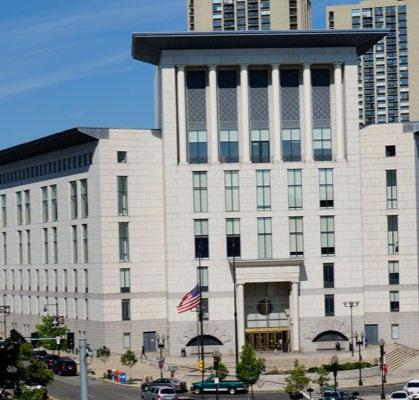


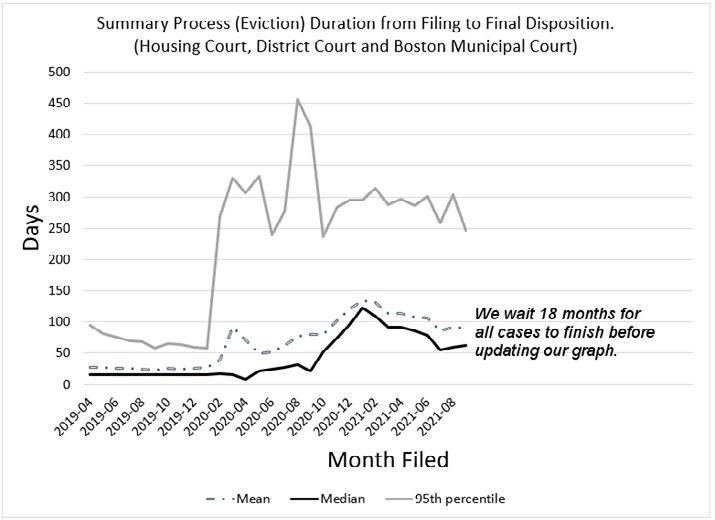
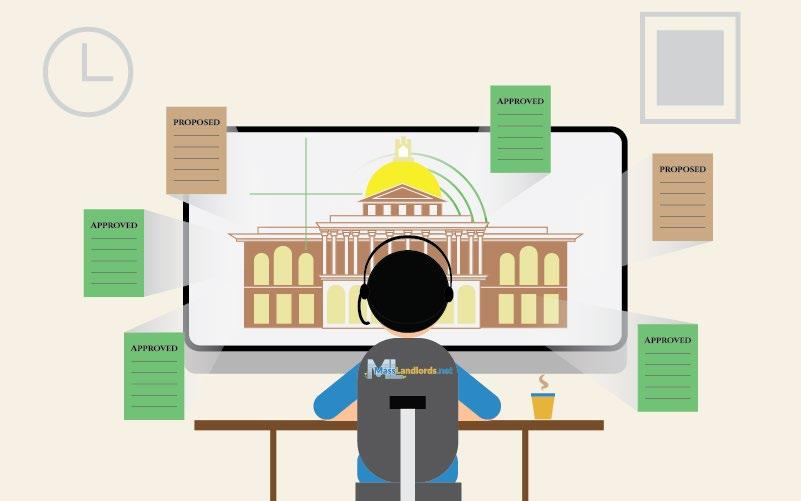
JUNE 2023 2 MASSLANDLORDS NEWSLETTER MASSLANDLORDS IS FUNDED PRIMARILY BY MEMBERSHIP DUES. THANK YOU FOR YOUR SUPPORT. Contents 19 8 16 6 4 3 Letter from the Executive Director 4 Massachusetts’ Open Meeting Law Does Not Apply to State Legislature 6 Summary Process Duration Tripled Under FY2024 Budget Proposal 8 Can Landlords Refuse Cash and Require Check or Electronic Rent Payments? 11 Eviction Sealing Hearing Held May 9 at State House 14 New Tenancies After May 12 Must Include Notice to Renters About Safe Housing Rights 16 Should You Take Last Month’s Rent at Lease Signing? 19 New Housing Court Rules Aim to Reduce Eviction Defaults and Move Summary Process Cases Faster 22 Three Years After Covid Shutdowns, Same Problems Still Frustrate the Rental Assistance Application Process 28 REGIONAL
Published by MassLandlords, 14th Floor, One Broadway, Cambridge, MA 02142.
The largest non-profit for Massachusetts landlords. We help you own, rent or manage. We create better rental housing.
info@masslandlords.net
774-314-1896
THE MASSLANDLORDS
BOARD OF DIRECTORS
Rich Merlino, President, through 2022
Alec Bewsee, Treasurer, through 2023
Michele Kasabula, Secretary, through 2024
Steffen Landrum, through 2025
Patrick Sullivan, through 2026
EXECUTIVE DIRECTOR
Douglas Quattrochi
INFORMATION MANAGER
Jillian Campayno
COMMUNITY BUILDER AND ACCOUNTANT
Naomi Richardson
WRITER, JOURNALIST, AND EDITOR
Kimberly Harper Rau, Eric Weld
FULL STACK DEVELOPER
Ron Software Development Services
LEGISLATIVE AFFAIRS COUNSEL
Peter Vickery, Esq.
SR MANAGER OF SERVICE AND MARKETING
Sue McMahon
BOOKKEEPING
Vipan Garg, Honeylyn Estopace
MANAGER OF ADVERTISING DESIGN AND PLACEMENT
Paul Ssemanda
MESSAGE BOARDS, SERVICE DIRECTORY, AND DATA
Fatima Cangas, Nomer Caceres, Emerson Raniaga, Maria Evangeline Legaspi
VIRTUAL REGISTRATION DESK
Naomi Elliott, Kaitlin McMahon
NEWSLETTER DESIGN
Ailar Arak
VIDEOGRAPHY
Paul Mong
TRANSCRIPTION
Prospero Pulma
PHOTOGRAPHY
Barry Collins, Paul Shea
SPANISH TRANSLATION
Paola Hernández, Stuart Carter
LOCAL VOLUNTEER TEAMS
BOSTON
Peter Shapiro, Steffen Landrum
CHARLES RIVER
Charles O’Neill, Paul Harris
SPRINGFIELD
Russell Sabadosa, Alec Bewsee
WORCESTER
Michele Kasabula, Richard Trifone, Patrick Sullivan
PARTNER ASSOCIATIONS
MWPOA Frank Hays and team
SWCLA Mark Marzeotti and team
NWCLA Brian Lucier and team
RHABC Jim Stockley III and team
MassLandlords’ views and opinions may not reflect those of partner associations.
With Immense Gratitude to Seven Decades of Past Volunteers
For pay-as-you-go business advice or legal information, visit MassLandlords.net/helpline
Cover Photo by Brett Wharton
CC BY 2.0
https://unsplash.com/photos/attsPxeNLMM
LETTER FROM THE EXECUTIVE DIRECTOR
Monthly Pricing?
Our Letter from the Executive Director for June 2023 asks whether we should allow new members to join on a monthly basis. We also review the changing policy landscape.
In May, our paid team and volunteer Board of Directors discussed allowing members to join and pay dues on a monthly basis. We also got a new Secretary of Housing and Livable Communities, testified at an eviction sealing hearing and asked the Department of Public Health to backtrack on part of the sanitary code.
The new state sanitary code took effect May 12. We have covered this by video business update, three events, and an article. In the three years leading up to this change, the Community Sanitation Division of the Department of Public Health never once put the Notice of Occupant’s Rights and Obligations to public comment. If they had, we would have objected. This is discussed in this edition and may be the start of another lawsuit.
Also in this edition, we discuss the eviction sealing hearing that happened on May 9. The Greater Boston Real Estate Board testified in favor of eviction sealing, on the opposite side of the issue as us.
The Governor announced former Worcester City Manager Ed Augustus as the next Secretary of Housing and Livable Communities. This role is newly created for Massachusetts, as the Executive Office of Housing and Economic Development has now been split in two. Renter advocates smiled publicly but some were surprised at the choice. Augustus has had little presence in renter advocacy or housing circles.
Turning our attention to ourselves, a proposal has been made to help members better manage cash flow: monthly dues. This would not be annual dues paid in monthly installments, like a legally binding lease. This would be something like, “Pay $40, be a member for one month.” Stop paying and membership would promptly lapse with no further obligation. The monthly price would probably be higher than the annual dues divided by 12. This seems to be standard practice for other membership websites.
The advantage of this plan might be to encourage more members to join and renew. Many of us are cashflow limited and would like to pay as rents come in.
One disadvantage is that a less scrupulous landlord could enroll for a month, download all our rental forms and quit. They would lose access to Home Depot savings, message boards and certification. But we know our up-to-date forms are a main attraction, so this would be an area to watch.
We can test whether we grow or lose out with a monthly offering. Many of us are happy with annual dues and would be free to stick with annual. Our average annual member stays with us a long time. But if we are to grow to reach as many landlords as possible, we may need to offer monthly dues.
Would you have concerns with switching to monthly pricing? Would you be more likely to join as a member? Or to renew? We welcome comments at hello@masslandlords.net. It would take a while to develop full processes for monthly dues, so there is plenty of time to guide our decision. If you would like to talk about it over Zoom, save the date for Friday, July 28, at 12p.m., the first of several member and public input opportunities.
MassLandlords’ work benefits owners, managers and service providers of rental housing across the industry. And there is so much work to do! Please join as a member, become a property rights supporter or increase your level of support.
Sincerely,
Douglas Quattrochi Executive Director
MassLandlords, Inc.

3 JUNE 2023 MASSLANDLORDS NEWSLETTER MASSLANDLORDS IS FUNDED PRIMARILY BY MEMBERSHIP DUES. THANK YOU FOR YOUR SUPPORT.
your camera app here to read more online.
Point
Massachusetts’ Open Meeting Law Does Not Apply to State Legislature
By Kimberly Rau, MassLandlords Inc.
Nearly all states make their House and Senate subject to open meeting laws.
Massachusetts is among the few that refuses that level of transparency.
Massachusetts gets low marks in many areas of transparency. A 2015 article by the Center for Public Integrity gave it an overall D+. But one of the most egregious examples of lack of accountability surrounds the fact that the open meeting law does not include the state legislature.
This means that the state Senate and House of Representatives are not held accountable in the same way that town and city councils, school boards and other municipal groups are when it comes to transparency in meetings. The people who are tasked with making the laws in our state are not required to give the public as much information as the members of your local school board. That’s a problem.
WHAT IS THE OPEN MEETING LAW?
The open meeting law states that “all meetings of a public body shall be open to the public.” This does not include closed meetings or sessions, also called executive sessions. It requires public bodies to give at least 48 hours’ notice of a meeting, not including weekends or holidays. And it compels these groups to record and keep accurate minutes of those meetings.
The meeting minutes that are recorded are considered public
record and are accessible through the state public records law, with certain exceptions.
HOW DOES MASSACHUSETTS COMPARE TO OTHER STATES REGARDING THE LEGISLATURE AND OPEN MEETING LAWS?
Most states include their legislature in their open meeting laws. However, Massachusetts is not among them. This 2011 article from the Reporters Committee for Freedom of the Press is somewhat outdated (California’s legislature is, at least now, subject to the open meeting law). However, the article shows that even 12 years ago, Massachusetts was in the minority when it comes to not including its legislature in the open meeting law.
Georgia and Oklahoma exempt their state legislatures from their open meeting laws. Delaware’s legislative caucuses are not subject to open meeting laws, but its legislative committees are. Minnesota does not include its legislature in its open meeting law, but has a separate law that covers it. And Oregon remains ambiguous. That makes Massachusetts one of very few states that does hold its legislature accountable under the open meeting law.
And how do these states do when it comes to integrity? We already covered Massachusetts’ lackluster record in this department. Georgia and Minnesota get a D- from the Center for Public Integrity; Delaware, Oklahoma and Oregon get an F. That’s not great company to be keeping.
TEXT MESSAGES MAY NOT BE RETAINED AS PART OF THE PUBLIC RECORD
Along with being exempt from the public meeting law, the legislature (also called the “general court”) is exempt from the public records law. The open meeting law and public records law are essentially two sides of the same democratic coin. The open meeting law allows the public to attend meetings and see democracy in action. The public records law allows people to access public information. But even when a public official is not exempt from the open records law, that doesn’t mean getting information will be easy.
Earlier this year, the Boston Globe put in a public records request for text messages to and from Boston Mayor Michelle Wu for the dates leading up to her first state of the city address, which was held Jan. 25.
The newspaper requested all text messages between Jan. 20 and 27, but received none. The reason? According to Boston’s public records officer Shawn Williams, the mayor “does not conduct official City business via text message and does not retain text messages.” The Globe article included a photograph of Mayor Wu texting on her cell phone. It strains belief that all of her texts are personal and completely unrelated to official business at all times.
The state does not have clear guidelines for text messages. It has a municipal records retention schedule, which states that general administrative records must be kept for three years,
JUNE 2023 4 MASSLANDLORDS NEWSLETTER MASSLANDLORDS IS FUNDED PRIMARILY BY MEMBERSHIP DUES. THANK YOU FOR YOUR SUPPORT.
and policy development-related correspondence should be retained for five. But “transitory messages,” which could include text messages, need only be retained “until administrative use ceases.”
Lawyers who spoke to the Globe for its story said that if the text messages in question related to city business, they should be considered part of the public record. The substance of the messages, in other words, not the medium with which they are conveyed, is what’s important.
But when the Globe requested all text messages from the Boston City Council for the same dates, it got exactly one text message back about food waste and pest control. This was between 13 city council members over the course of a week.
It’s pretty far-fetched to believe in today’s digital age, none of the city officials whose records were requested use their cell phones to communicate via text message. But if the city isn’t responding, what recourse does one have? MassLandlords is currently suing the City of Boston for records based
around the establishment of its Rent Stabilization Advisory Committee. We asked for correspondence surrounding how the members of the committee were selected; so far, we have received nothing that actually answers the question.
WHAT DOES IT MEAN TO BE IN A DEMOCRACY?
Being in a democracy is more than having the opportunity to get out and vote (and given the high number of bills designed to restrict access to voting, even that seems to be in jeopardy). It means being able to oversee your elected official’s performance and, if unlawful, unsatisfactory or corrupt, hold them accountable. But how can you do that when getting the information necessary to make informed decisions may be highly restricted, or simply not available?
If politicians can delete text messages at will, claiming that they are “transitory,” and if cities can claim records don’t exist, or at least not be compelled to produce them under any real threat of
consequence, how can those who wish to know the whole story hope to learn it?
It’s time for Massachusetts to compel its legislature to be held to the same open meeting act and public records law that applies to its local school departments and city councils.
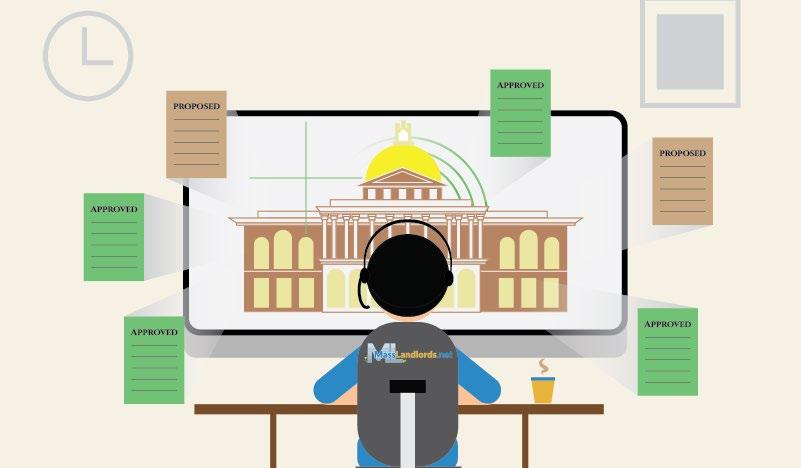
Access to public information is the bare minimum for active participation in a democracy, and is the foundation of democracy itself. How are we expected to govern ourselves if we are neither allowed to attend meetings, nor see the records that result? ML
Point your camera app here to read more online
5 JUNE 2023 MASSLANDLORDS NEWSLETTER MASSLANDLORDS IS FUNDED PRIMARILY BY MEMBERSHIP DUES. THANK YOU FOR YOUR SUPPORT.
Massachusetts General Court: We’ve got our eyes on you. It’s time for the Mass. Legislature to be subject to the open meeting law and public records act. [Image License: CC by SA 4.0 MassLandlords, Inc.]
Summary Process Duration Tripled Under FY2024 Budget Proposal
Chapter 257 of the Acts of 2020 tripled summary process duration while we waited for rental assistance. Now the legislature aims to bring it back.
On Wednesday, April 26, the House approved a Fiscal Year 2024 budget amendment that would restore a pandemic law. This law tripled summary process (“eviction”) duration. We are asking members and the general public to contact their senators and ask that
the language of House Budget Outside Section 28 be removed.
A change as sweeping as this should be put through normal legislative process, including hearing, so that the concerns of renters and landlords alike can be heard.
Summary process is the legal process by which landlords access rental assistance or enforce tenancies. Two-thirds of summary process cases are known to end with a renter remaining in their home (not evicted). It’s suggested that up to 90% end this way but the data is fuzzy. One thing isn’t fuzzy: the courts are going three times slower than ever. The graph ends mid-2021 because we are still waiting for cases filed then to finish before we add them. Eviction Data CC BY-SA 4.0 MassLandlords.

JUNE 2023 6 MASSLANDLORDS NEWSLETTER MASSLANDLORDS IS FUNDED PRIMARILY BY MEMBERSHIP DUES. THANK YOU FOR YOUR SUPPORT.
The laws should be fair for everyone, but this proposed law is not.
In a nutshell, the proposed law would pause nonpayment eviction cases while an application for rental assistance is pending. In principle, we are all fine with this. No one should be evicted while the safety net does its job. Fewer than one-third (possibly only one-tenth) of all summary process filings ever result in an eviction.
In practice, the safety net has failed so devastatingly that in December 2021, MassLandlords filed suit against the Department of Housing and Community Development. Their affidavit shows that they lost to supervision 47,000 of the 151,000 applications for rental assistance. These are believed to be printed out on paper, stored in boxes and scattered among the agents of the commonwealth. This litigation is ongoing.
Meanwhile, landlords, renters and the courts alike waited in limbo for a
response that would never come. Tens of thousands of applications timed out. Average summary process duration increased from 25 days to 94 days. Half of all summary process cases used to be resolved in 15 days, but now suddenly half of all cases were being resolved in 64 days. Ninety-five percent of cases used to be resolved in 62 days. But under this law, 95% of cases were resolved in 288 days.
This law lapsed after March 31, 2023. It was right to lapse it. It was papering over gaping holes in our safety net. Rental assistance and court delays caused small housing providers to go out of business at twice the normal rate.
But it was wrong to lapse it without an alternative. There is a legitimate need for a safety net. In Massachusetts, we are in a good position to lead by example. Our safety net stopped tens of thousands of people from being evicted during the pandemic.
Pausing the courts to wait for rental assistance without simultaneously fixing rental assistance will ultimately destabilize landlords and renters alike. If the rental assistance is never going to arrive, the law hurts everyone and helps no one.
MassLandlords staff are standing by to assist with safety net reform (indeed, we have already filed separate legislation to do this).

Please ask your senator to strike this language from the senate budget and to strike it from the conferenced budget. ML
Point your camera app here to read more online
JUNE 2023 MASSLANDLORDS NEWSLETTER
Can Landlords Refuse Cash and Require Check or Electronic Rent Payments?
By Kimberly Rau, MassLandlords Inc.
Massachusetts law says retail establishments cannot refuse to take cash, but can landlords require other methods of payment?
In 1978, Massachusetts made it illegal for retail establishments to refuse to accept cash, stating it was discriminatory to allow only certain forms of payment. But, do landlords have to follow that law as well when collecting rent?
Massachusetts General Laws Part 3, Chapter 255D, Section 10A, specifically states: “No retail establishment offering goods and services for sale shall discriminate against a cash buyer by requiring the use of credit by a buyer in order to purchase such goods and services. All such retail establishments must accept legal tender when offered as payment by the buyer.”
This wording has led some to believe that anyone taking payment for any type of product or service must accept cash if it is offered, but this is not the case. At least some Massachusetts government offices do not take cash payments. For landlords, it actually makes sense to insist on a check or electronic payment for rent, the security deposit and other rental-related payments.
ACCEPTING CASH CAN PUT YOU AT RISK
If a check goes missing, it can be canceled. If an electronic payment goes awry, the bank or processing agency can look into it. But what happens when cash disappears?
Naomi Richardson, MassLandlords’ community builder and accountant, recalled when she worked for a property management company. The owner of the company would accept cash rent payments, but, more than once, someone broke into the office and made off with thousands of dollars.
Richardson said, with the first break-in, the owner was relatively certain the thief was someone who had been in the office when she took the payment. The cash had been placed in a relatively obscure place (but not locked up), and after the burglary, the only thing missing was the two months of rent that had been paid in cash. Camera footage showed someone entering the building, but did not get a clear image of the person’s face.
“She would have never thought in a million years she would have gotten robbed,” Richardson noted.
After that, the owner got a safe. She also stopped accepting cash payments except for the occasional circumstance when a tenant insisted on paying cash.
“The second time it was just blatant robbery,” Richardson said. In that instance, the theft seemed more random. Computers and other office items had been stolen along with some rent that had not yet been placed in the safe.
Still, the owner was left with little recourse. The cash was gone.
CASH CAN CREATE OPPORTUNITY FOR MISUNDERSTANDING
Richardson also said that accepting checks or electronic payments removes any doubt about how much was paid. Imagine your tenant drops off $1,800 in
an envelope for that month’s rent. You accept the envelope, but don’t open it immediately. When you count the money, you notice there’s only $1,700 accounted for, but your tenant insists they sent the full amount. Now you’re locked into a he said/she said battle, with no evidence on either side.
Of course, the way to avoid that problem is to count the money in front of the renter. But imagine the many scenarios where that’s not possible. Someone other than the tenant drops off the money, or someone else accepts it because you can’t come to the door at that moment. You write the receipt without counting closely. In a perfect world, this wouldn’t happen, but humans slip up. One mistake could cost you a portion of the rent.
A PAPER TRAIL PROTECTS YOU AND YOUR RENTERS
Not only are you not obligated to accept cash for rent-related payments, it’s good practice to require your renters pay by either check (personal or bank check) or electronically, such as through RentHelper. This creates a paper trail (or an electronic record) that shows both you and your tenant when the rent was paid. If nonpayment of rent ever becomes an issue, it will be easy to look back and see what rent was received, and when.
Many banks and credit unions offer their users the ability to see an electronic scan of a paper check when it is deposited against their account. This digital image is also helpful if your tenant ever needs to show you that a rent check was deposited.
JUNE 2023 8 MASSLANDLORDS NEWSLETTER MASSLANDLORDS IS FUNDED PRIMARILY BY MEMBERSHIP DUES. THANK YOU
YOUR
FOR
SUPPORT.
Your renter may also have bill pay functionality through their bank. You provide your banking information or address, and the bank will send you their rent payment either electronically or by physical check in the mail.
Checks make sense for renters. A page on student housing from Boston University advises applicants to use checks, not cash, when applying for apartments and other rentals, likely because this protects them if a payment is ever called into question. Paying by check also helps protect the check writer against fraud. When a check is deposited, the bank that accepts the check writes identifying numbers onto the back of it. These numbers identify the depositing bank if there is ever concern that someone
fraudulently accepted the payment. How?
All banks and check-cashing services are bound by federal anti-money laundering regulations that require them to “know your customer.” This means that someone will know the identity of the person who deposited that check, giving you recourse in the event things turn out to be questionable.

MY TENANT DOES NOT HAVE A BANK ACCOUNT. HOW SHOULD THEY PAY RENT?
Renters may not have a bank account, or may only have a savings account, for a variety of reasons. Some of these reasons could be red flags (a history of writing bad checks), but others may be neutral, especially if you are renting to students or recent graduates who are
just starting out in the working world. Six percent of adults in America do not have some type of banking set up, and quite a few renters who used RentHelper were unbanked.
Three percent of those unbanked tenants using RentHelper enrolled in Netspend and paid their rent that way. Netspend is one example of a company that offers something called a “debitable cash card,” which can be an alternative to a traditional banking setup. The card is purchased at a retailer such as a 7-11 or other convenience store. Your tenant gives the cashier their rent money, who credits the amount to the renter’s card. Your renter can then use the card to pay their rent.
Some unbanked tenants who signed up with RentHelper used different services,
9 JUNE 2023 MASSLANDLORDS NEWSLETTER MASSLANDLORDS IS FUNDED PRIMARILY BY MEMBERSHIP DUES. THANK YOU FOR YOUR SUPPORT.
Yes, it’s legal for landlords to accept cash payments for rent, but should we? And is it legal to refuse cash entirely? (Image License: Unsplash)
including cash apps and other brands of debitable cash cards, to pay their rent.

If your tenant has a savings account, they should be able to set up bill pay from the savings account, or have a bank check drawn up for you.
If your renter does not have any kind of banking set up and is unwilling to explore something like Netspend, you could accept cash, or you could also have your tenant pay the rent through money order. Money orders have some similar risks to cash, but lost money orders can be replaced. If someone other than you tries to cash the money order, you can involve the police and find out who endorsed the back of the money order, and where they cashed it.
Alternatively, they can go to your bank and deposit the money directly to your account with a deposit slip (yes, your account and routing number will be on this slip, but they are also on every check you write and give to someone).
If you go either of these routes, make sure you write your renter a receipt after you receive the money order or see the deposit in your account.
WHAT IF I HAVE TO ACCEPT CASH FOR RENT PAYMENTS?
If you absolutely must collect cash for rent, or the security deposit, make sure you write your tenant a dated receipt for the payment every time, and keep a copy for your records. One of the reasons we recommend taking checks or electronic payments is that doing so saves you this step, and allows your tenant to skip paying the rent in person.
If your tenant is inclined to mail you cash, request they stop this practice immediately. Mail gets lost, and unless they send it as registered mail, they will be out of luck if that envelope does not get to you.
Conclusion: Yes, it is Legal to Say “No Cash Payments Accepted.”
However you choose to operate your rental business, we can find no statute stating that you must accept cash for rent-related expenses. You may want to take cash, or make an exception for a tenant, but if you do not, there is no law that compels you to do so. There are a lot of reasons why accepting cash for large sums of money is a risky move, and plenty of alternatives to doing so. We suggest you encourage your renters to utilize them whenever possible. ML
Point your camera app here to read more online
JUNE 2023 MASSLANDLORDS NEWSLETTER
Eviction Sealing Hearing Held May 9 at State House
Find out what happened at the State House hearing on eviction sealing held May 9, 2023.
MassLandlords’ Executive Director Doug Quattrochi testified at the May 9 hearing against eviction sealing. Surprisingly, small and mid-sized landlords seemed at odds with the Greater Boston Real Estate Board, who sat alongside Senator Edwards in supporting the HOMES Act, a proposal that eviction records be sealed. Eviction sealing would make it harder to identify applicants who are coming off an eviction with their prior landlord.
Renter advocates say eviction sealing is necessary because not all landlords read and understand the court records, and therefore unfairly dismiss some applicants for rental housing.
A coalition of all the usual renter advocates appeared to support the HOMES Act, including CHAPA, Harvard Legal Aid Bureau, the Massachusetts Law Reform Institute, the Massachusetts Coalition for the Homeless, the Alliance of HUD Tenants, the Metropolitan Area Planning Council and the Somerville Office of Housing Stability. Unusually, others whose roles seem less clearly pertinent also testified, including the Massachusetts Catholic Conference, Attorney General Andrea Campbell and Suffolk County District Attorney Kevin Hayden. A total of 107 were registered to testify at the hearing, but most spoke on another topic.
Despite apparent support, this hearing indicated that the HOMES Act may be foundering. Senator Edwards attempted to address comments made in MassLandlords’ written testimony, but was cut short.
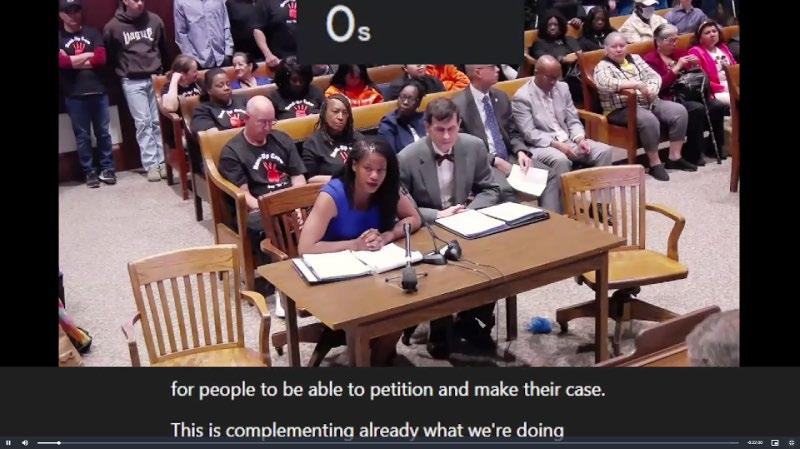
She started, “This system [MassCourts. org] was not set up to allow people to screen out and discriminate against individuals. One of the ideas proposed is that we should somehow make people with eviction records a protected class. That literally means defining that person as an evicted tenant for the rest of their life and providing them protections.”
At this point, Representative Michael Day, chair of the hearing, said, “Senator, I hate to interrupt, but we’re going to have to ask you to wrap up.”
Representative Day had previously pointed out that time was up and had let the senator run over substantially.
MassLandlords has counter-proposed keeping court records open indefinitely and requiring landlords to evaluate them on a case-by-case basis. Whereas some prior evictions are no concern for some landlords, that same eviction for another landlord in another situation may be a disqualifier. Each landlord should see the record and decide whether that eviction
is relevant. Some eviction filings will be irrelevant for all landlords, such as landlords and renters who accessed rental assistance and left court together again. The same case-by-case treatment has applied to records of arrests and convictions for many years now, and seems to be addressing concerns on all sides.
Senator Edwards did not explain how the MassLandlords’ proposal to expand discrimination protections would be worse than the CROWN Act, the most recent expansion of discrimination protections, which she supported without reservation last year. The CROWN Act makes it unlawful for landlords to comment on or consider hair styles normally associated with race. Senator Edwards wears locs. MassLandlords supported and produced a short training on the CROWN Act.
Senator Edwards also said, “We have talked with the courts” in the context of listing others in support. This seems to indicate a disconnect in the forecasts
11 JUNE 2023 MASSLANDLORDS NEWSLETTER MASSLANDLORDS IS FUNDED PRIMARILY BY MEMBERSHIP DUES. THANK YOU FOR YOUR SUPPORT.
Senator Edwards (left) supported eviction sealing in a panel of two with Greg Vasil, CEO of the Greater Boston Real Estate Board (right). Public domain.
between MassLandlords’ estimate of the number of eviction sealing petitions and court staffing.
Our written testimony estimates that as many as 300,000 petitions could be filed for prior cases if the bill were to pass, and that 30,000 petitions per year could be filed thereafter. We also noted that the website SealMyEviction.com has already been registered to someone (it was not us!). This could make eviction sealing petitions as frequent as emotional support animal certificates purchased online, except SealMyEviction.com would directly generate work for the courts at taxpayer expense. It seems unlikely that the courts could sustain the level of eviction sealing activity we forecast, especially since landlords may contest eviction sealing. We predict lots of landlords will still remember and feel strongly enough about their case to oppose it being sealed.

Although it’s hard to predict what will happen, the MassLandlords testimony may have dampened enthusiasm for this bill. We arranged written testimony from half a dozen members, including Winton Corp in western Massachusetts, South Shore Apartments and individual landlords from across the state, including Erin Zamarro, Abi Weeks and Chris Scott. We are very grateful to these members who took the time to write the legislature.
The HOMES Act makes it likely that smokers evicted under a no-cause eviction procedure will be incorrectly screened into no-smoking housing.
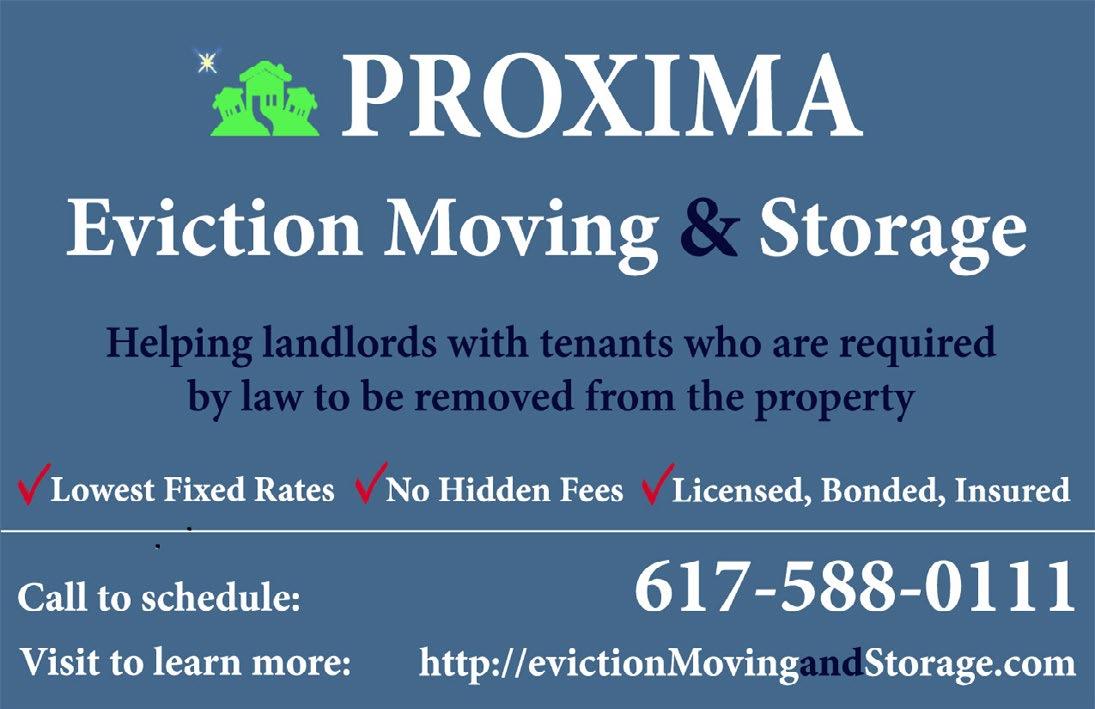
It seems possible that the Greater Boston Real Estate Board’s role in

supporting eviction sealing has been to water it down to much less than it was. They may want to aid in passing a useless bill rather than to oppose and lose against a strong bill.
In December,
GBREB went on record with GBH as supporting eviction sealing. MassLandlords reached out to Trish Baumer at GBREB on Dec. 15, 2022, to request a phone call to discuss it. But Baumer demurred and said they wanted to wait and see what Senator Edwards filed.
Whereas four years ago, the eviction sealing proposal was to take effect for every case automatically upon filing, the latest HOMES Act would require a petition no sooner than (in the case of for-cause evictions) seven years after the last appeal ends.
Several commenters at the hearing based their testimony on prior bill versions, not realizing the latest version left their case unsealed and open to inspection.
For example, Gladys Vega, Executive Director of La Colaborativa, told the legislature at the hearing that she had been filed against 13 times since 1989, which would be an average eviction rate of once every two years (if she were an adult in 1989 and eligible to be named starting then). She supported the HOMES Act, not recognizing that the latest text would probably leave her name visible like that of most repeat defendants. (Her testimony was unclear in another sense, as well: we searched MassCourts.org and could not find Gladys Vega listed in Eastern Housing
Court or Chelsea District court, the two jurisdictions that would apply based on her stated city of residence. This goes to show that MassCourts.org is far from the instant blocklist renter advocates make it out to be.)
In general, staff were surprised not to see much renter turnout, especially organized by groups like City Life/Vida Urbana, who were entirely absent.
MassLandlords left the hearing at 6:15 p.m. when it was still ongoing, but by which time testimony on the HOMES Act was declared complete by the chairs and the hearing had moved on to other topics.
Opposing eviction sealing is a top priority for members participating in our ongoing policy priorities survey. The HOMES Act full text is broken down into pieces and discussed, and our written testimony is filed and visible on our site. If you want to oppose eviction sealing, contact your representative and senator and ask them to write an email to the Chairs of the Joint Committee on the Judiciary that S.956 and H.1690 ought not pass.ML
Point your camera app here to read more online
JUNE 2023 12 MASSLANDLORDS NEWSLETTER MASSLANDLORDS IS FUNDED PRIMARILY
YOU FOR YOUR
BY MEMBERSHIP DUES. THANK
SUPPORT.
HEALTHY HOMES FOR BETTER LIVING! • Indoor Air Quality • Lead Paint Inspections • Mold Testing & Analysis • Serving all of MA & NH Call Toll Free: 800-349-7779 1 Arcadia St. Dorchester, MA 02122 Phone: 617-288-8870 Fax: 617-282-7783 Inspections@asapenvironmental com www.asapenvironmental.com Osterville 508-428-1669 Brockton 508-580-4800 Rockland 781-982-8700 Worcester 508-755-7320 Lawrence 978-686-0003

13 MASSLANDLORDS IS FUNDED PRIMARILY BY MEMBERSHIP DUES. THANK YOU FOR YOUR SUPPORT. Property Maintenance Owner Communication Bookkeeping Rent Collection Leasing & Tenant Screening Creative Solutions What we do, so you don’t have to. The MerGo Experience Customer Service focused, MerGo brings a fresh perspective to Property Management. Our Services Boston • Brookline • Cambridge • Somerville • Medford • Newton • Watertown Contact: Lucas Merchant • lucas@mergogroup.com • (617) 990-6201 • mergogroup.com PROPERTY MANAGEMENT 5% Flat fee & No Maintenance or Service Upcharge Get the responsive service you, your property, and tenants expect, plus the ROI you deserve. Currently accepting new clients.
New Tenancies After May 12 Must Include Notice to Renters About Safe Housing Rights
By Kimberly Rau, MassLandlords Inc.

The Massachusetts Department of Public Health requires all tenants to be notified about their rights to safe housing; however, as worded, the notice does not benefit landlords or renters.
As of May 12, 2023, landlords must provide renters starting a new tenancy with the state-issued Notice of Occupants’ Legal Rights and Responsibilities. However, we have reached out to the Department of Public Health (DPH), as we have serious concerns with the verbiage of the document.
The notice is supposed to help tenants understand their rights surrounding CMR 410, the state sanitary code, as well as provide next steps should their housing not meet sanitary code standards. We applaud this effort. All renters deserve safe, habitable housing, and all landlords
should be striving to keep their homes in compliance with the sanitary code.
Our issues lie with how the notice is worded in certain places. For instance, one portion of the notice reads, “If you think that conditions in your home are unsafe or unsanitary and may violate the Housing Code, you should contact your local health department.”
This is problematic on several levels. First, the word “should” implies that renters have a legal obligation to contact their local health department before talking to their landlord. But it’s in both parties’ best interests for tenants to discuss any concerns with their housing provider before talking to the board of health.
First, discussing the problem with the landlord gives them the opportunity to address the issue right off the bat. This keeps the lines of communication open and allows for good will between renter and landlord. And tenants can always
contact the health department if the landlord fails to fix the problem.
But perhaps more importantly, the law allows renters to withhold rent if their housing is sub-standard. Whether the tenants retain possession depends on whether they owe the landlord more than the landlord owes them, once the landlord has been given notice. Yes, you will receive notice once the board of health has completed its inspection, but that could be weeks later. Those weeks do not work in the tenant’s favor, because the landlord was not on notice, and it makes it harder for them to maintain possession. It also may end up costing the landlord more money, since certain problems may get worse before they receive notification.
The way the law is structured encourages renters to let their landlords know about problems at least as soon as they contact the health department. The notice works against this by implying tenants do not need to bring their concerns to you, the housing provider.
JUNE 2023 14 MASSLANDLORDS NEWSLETTER MASSLANDLORDS IS FUNDED PRIMARILY BY MEMBERSHIP DUES. THANK YOU FOR YOUR SUPPORT.
This section of the new Notice of Occupants’ Legal Rights and Responsibilities is just one area of concern. Encourage your tenants to speak to you first about problems, so you can fix them as soon as possible. [Image: Public Domain]
LISTED RESOURCES VIOLATE LANDLORDS’ FIRST AMENDMENT RIGHTS
Our second issue with the notice is on page 2, where tenants are directed to a list of resources, including masslfr.org, masslegalhelp.org and madeuptocode. org. While these sites may be useful, they are not government sites. In fact, they are owned by organizations that advocate for policies that are contrary to landlord interests.
Why is this an issue? It’s a problem because these are not objective resources. A recent court memorandum and order from a 2020 case, Baptiste v. Kennealy, speaks out against use of such resources.
“[T]he court finds that plaintiffs are likely to prevail on their claim that the second paragraph of 400 C.M.R. §5.03(2) unconstitutionally compels speech by requiring plaintiffs to include in any notice of rent arrearage addresses of non-governmental websites that, in turn, refer tenants to tenant advocacy groups, including City Life/Vida Urbana, with interests adverse to plaintiffs’.”
This is exactly what the new notice does. By insisting we give tenants a notice that directs them to those sites, the state is compelling us to make our tenants the customers of our political opponents. The only way such an order would be lawful is if the websites were operated entirely by non-political organizations, which they aren’t.
As structured, this violates landlords’ first amendment rights. Compelled referrals of this kind, along with the verbiage that suggests landlords are endorsing those sites, makes this compelled speech.
We have voiced our concerns to the DPH, urging them to suspend the requirement of issuing the notice until the verbiage of the notice can undergo a notice and comment period just as the regulation itself did. We asked the DPH to issue a retraction within seven days, which they failed to do. We asked that they start notice and comment within 120 days. Concerns such as ours should be properly heard and addressed by DPH,
but it may be necessary for us to obtain a court order.
In the meantime, we recommend you comply with the law and provide your new tenants a copy of the notice, or post it, as required. But when you present them with it, let them know that you are always willing to hear about their concerns as soon as they arise, and will be happy to address them as soon as possible.
We will keep you updated on any changes with this regulation as they may occur. ML
Point your camera app here to read more online
Can a Triple-Decker be Retrofitted for Geothermal Heating and Cooling?
The triple-decker is a Massachusetts architectural icon and, to many, a beloved aspect of New England history and urban landscape. But can these symbols of Massachusetts cultural history, most of which were built 100 years ago or more, be updated for today’s and tomorrow’s energy efficiency technologies?
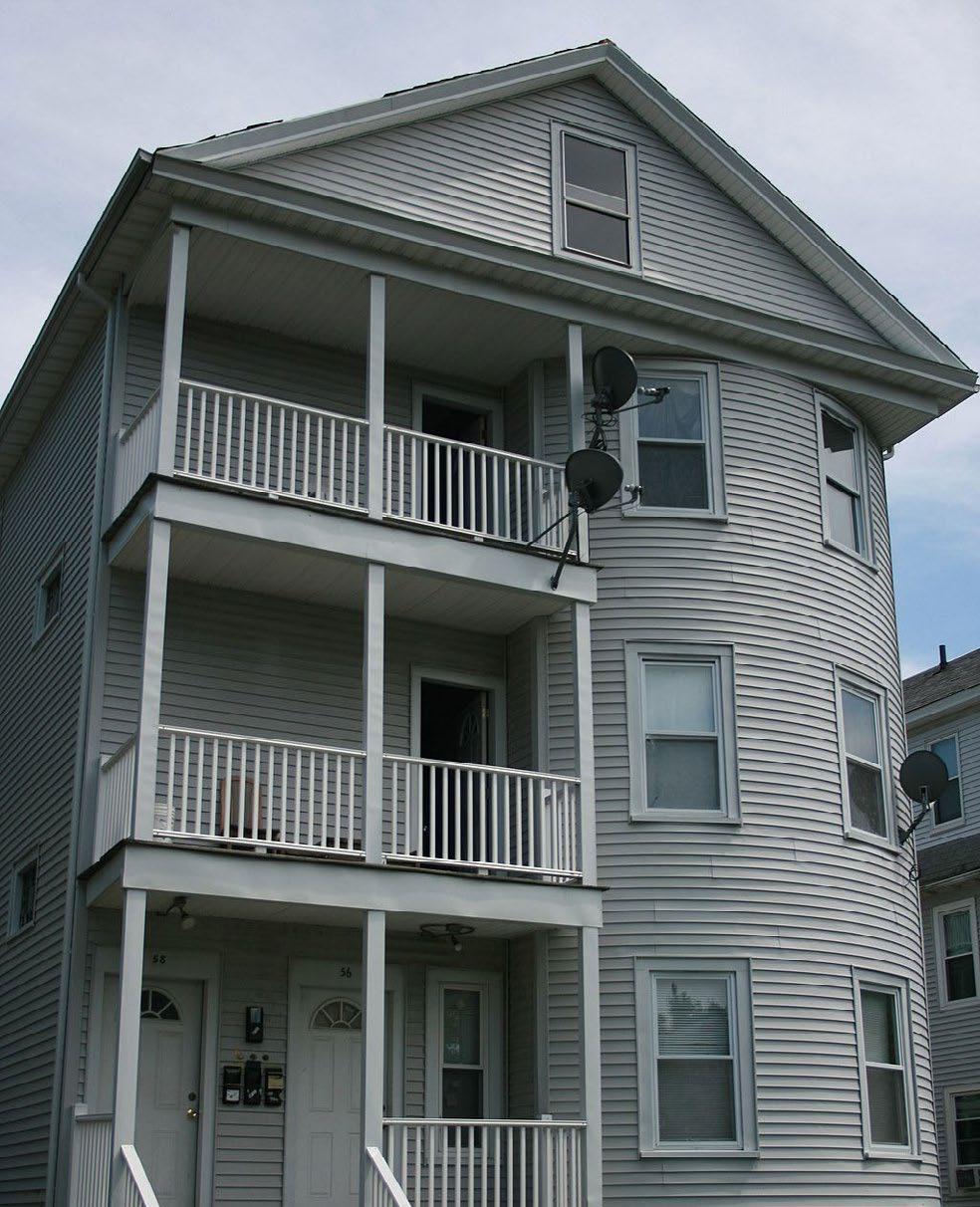
15 JUNE 2023 MASSLANDLORDS NEWSLETTER MASSLANDLORDS IS
PRIMARILY
FUNDED
BY MEMBERSHIP DUES. THANK YOU FOR YOUR SUPPORT.
ARTICLE YOU MAY HAVE MISSED
Point your camera app here to read more online.
Should You Take Last Month’s Rent at Lease Signing?
 By Kimberly Rau, MassLandlords Inc.
By Kimberly Rau, MassLandlords Inc.
The law entitles landlords to collect the last month’s rent when a new tenancy begins, but should you? If you do, what rules must you follow?
Massachusetts law entitles landlords to collect the following fees at lease signing, and no more: a security deposit equal to one month’s rent, the first month’s rent, the last month’s rent and the cost of re-keying the rental. But you are under no obligation to collect these fees if you don’t want to. If you do decide to collect the last month’s rent when a new tenancy begins, there are some rules you must follow.
In this article, we’ll review some commonly asked questions about the last month’s rent. Read on to
determine whether collecting this fee is right for you.
IS THE SECURITY DEPOSIT THE SAME AS LAST MONTH’S RENT?
First and foremost, the security deposit you may collect from your tenants is not the same thing as last month’s rent.
The security deposit belongs to the tenant and must be returned to them when the tenancy is over, unless damage outside normal wear and tear has been found. The laws surrounding withholding money from the security deposit are just as rigid as the laws governing how the security deposit is handled during the tenancy.
The last month’s rent, on the other hand, is a prepayment of the final month of tenancy. It belongs to you, the landlord, just as it would belong to you if you
waited until the final month to collect the money. You do not have to issue a conditions statement when you accept it, or return it at the end of the tenancy. You do, however, have to issue your tenants a receipt, and an annual interest statement, if applicable.
IF I RAISE THE RENT, CAN I COLLECT ADDITIONAL MONEY AS LAST MONTH’S RENT?
Taking last month’s rent at the start of a tenancy is not a deposit. MGL Ch. 186, Section 15b, states that a landlord may collect last month’s rent. This same section also discusses security deposits. A security deposit is just that, a deposit. The last month’s rent is not. It is a collection of “rent for the last full month of occupancy calculated at the same rate as the first month.”
What this means is that if you later raise the rent without starting a new lease, you may not collect more money for the last month’s rent. This is because the last month’s rent must be equal to the first month’s rent under the law. If you go the “lazy raise the rent” route, you cannot bill the tenant for the difference between what they already paid and what the new rent is.
If you wish to collect more money against the last month of rent, you should create a new tenancy agreement. Return the last month’s rent you’ve already collected, or use it to credit the renter for the last month of the tenancy under the original rent. Then you can collect a new payment equal to the new monthly rent.
This inability to simply collect the difference between old rent and new rent is one reason some landlords do not take last month’s rent at signing. It’s one less step to follow if you renew a lease and
JUNE 2023 16 MASSLANDLORDS NEWSLETTER MASSLANDLORDS IS FUNDED PRIMARILY BY MEMBERSHIP
THANK YOU FOR YOUR SUPPORT.
DUES.
Play to your strengths as a landlord. Landlords who excel at interpersonal relationships should take last month’s rent. Landlords who keep excellent records should take a security deposit. (Image License: Unsplash)
raise the rent. Check with your attorney if you have questions about returning the last month’s rent and collecting a new payment.
MUST I PUT THE LAST MONTH’S RENT INTO AN INTEREST BEARING ACCOUNT, OR CAN I SPEND IT?
The law surrounding security deposits makes clear that a security deposit must be placed in an interest-bearing account that is “beyond the claim of creditors of the lessor.” In practice, this means that the account is either in the renter’s name or in the name of a third-party escrow agent (that is, not in the lessor’s name). But the directives for last month’s rent payments are a bit murkier, in part thanks to court decisions.
The official word from mass.gov is that tenants are entitled to interest from the last month’s rent. Much like security deposits, last month’s rent payments are subject to 5% interest if not stored
in a bank, or at whatever interest rate the bank offers.
But in the court case Gallo v. Marinelli, the appeals court determined that tenants are not entitled to interest from a last month’s rent payment unless the payment is stored in the bank.
Quoting an earlier court case, Neihaus v. Maxwell, the appeals court found that “[d]eposits of ‘last months’ rents are, with certain limitations, the property of the landlord, not the tenant.’”
“’The landlord is not required to set aside the tenant’s last month’s rent or to place it in a bank account; however, he is required to pay interest on it at five per cent or any lesser rate paid by the bank, if the money is, in fact deposited,’” the appeals court continued, further quoting from Neihaus.
In other words, unlike the security deposit, which belongs to the tenant, last month’s rent belongs to the landlord.
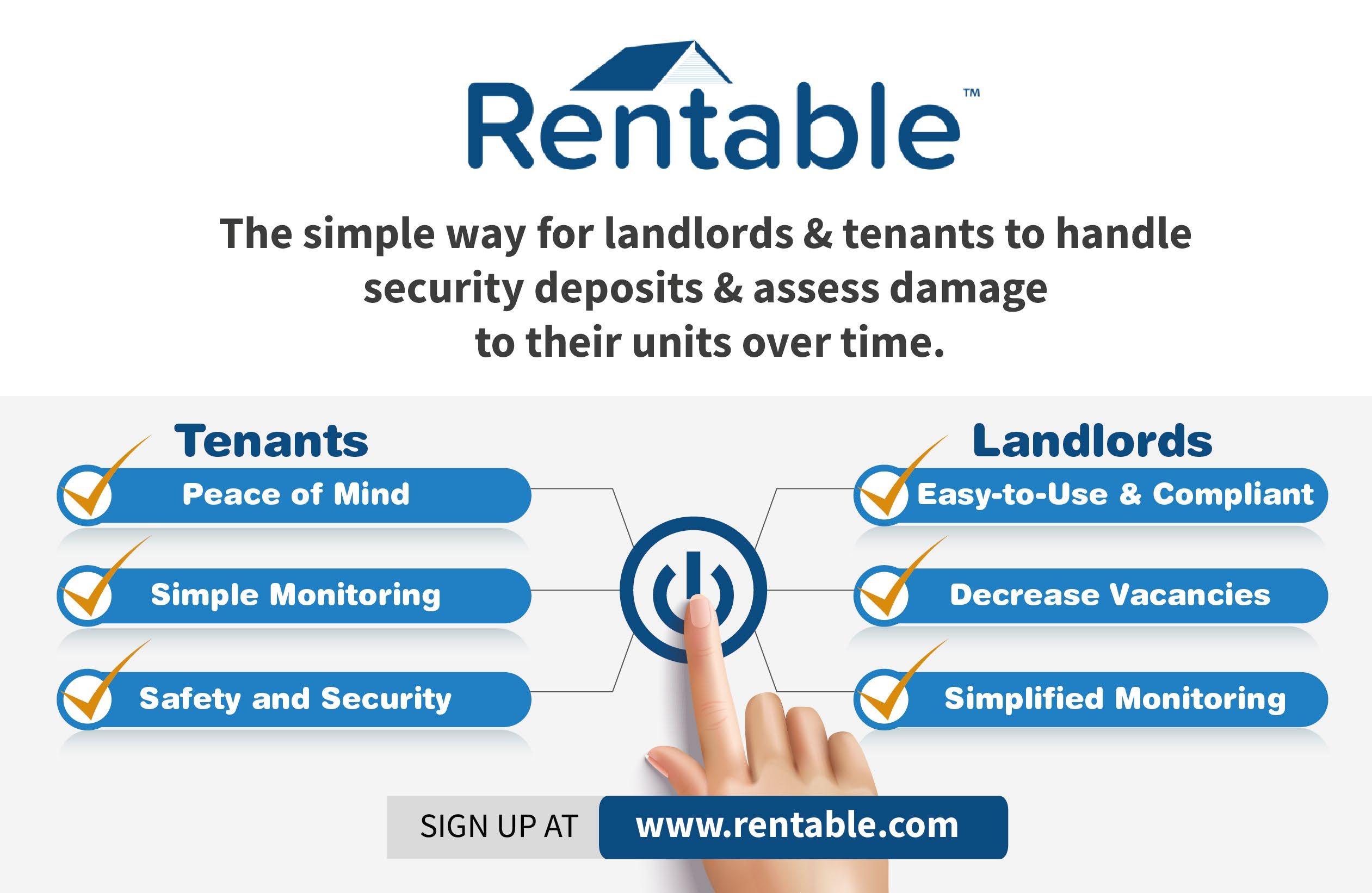
“There is no such provision mandating the placement of the last month’s rent
in an interest-bearing bank account. We therefore conclude that only when the lessor places a tenant’s last month’s rent in an interest-bearing account is the tenant entitled to interest,” the appeals court concluded.
While this doesn’t exactly make sense (why would the tenant be entitled to interest if the last month’s rent belongs to the landlord?), it does indicate that only the security deposit needs to be placed in an interest-bearing bank account. The appeals court determined that interest need only be paid if the last month’s rent is placed in an interest-bearing account.
If the payment of last month’s rent belongs to you, then technically, yes, you can spend it ahead of time. But we don’t recommend you do. In fact, there are reasons why we don’t recommend that everyone should take last month’s rent. Instead, we suggest you play to your strengths as a landlord when deciding what money to collect at the start of a tenancy.
17 MASSLANDLORDS IS FUNDED PRIMARILY BY MEMBERSHIP DUES. THANK YOU FOR YOUR SUPPORT.
WHO SHOULDN’T TAKE LAST MONTH’S RENT
It might seem counter-intuitive to advise landlords not to take the last month’s rent at the start of a new tenancy, but there are reasons to avoid it.
If landlord-tenant interactions and business relationships aren’t your strong suits, you probably don’t want to collect last month’s rent. Why? Last month’s rent requires careful communication about what it is, as well as when it applies.
As we’ve already discussed, you cannot collect more last month’s rent if you raise the rent, unless you take steps to end the current tenancy and start a new one under a new agreement. If you don’t want to do this, collecting the last month’s rent in advance is essentially giving a discount on the final month of tenancy. Remember, you already sold the last month’s rent at the price of the first month. This is a full rent payment, not a deposit on the last month’s rent.
Collecting last month’s rent in advance opens you up to other headaches as well. You have to keep track of that payment. Say your tenant can’t pay rent one month, and you apply the last month’s rent to cover the shortage. Fast forward to the last month of the tenancy, and your renter is claiming they already paid you for that month. If that happens, you will need records of when you took the payment, when it was applied, and for what.
Also, consider a situation in which your tenant informs you they’re moving out. You could apply the last month’s rent to that month, but then they end up not moving out. Then, they don’t pay the next month either. Now you’ve applied the payment to the month they said they were leaving, and have to deal with the fact that they’re late on the current month. Your renters knew they were out of money when they gave notice, but you are only finding out now, a full month later. Waiting to collect rent until the first of each month saves you this problem as well.
WHEN TO TAKE LAST MONTH’S RENT INSTEAD OF A SECURITY DEPOSIT
On the other hand, if you are good at landlord-tenant relationships, but not great at bookkeeping, consider taking last month’s rent and skipping the security deposit. Security deposits require meticulous record-keeping and handling, and the consequences for messing up can be very expensive.
If you don’t take a security deposit, or if you do and the deposit is not enough to cover damages, you can always file a small claims lawsuit for damages. This is also true if you initially take a security deposit, but decide to return it to avoid triple damages in the future. No matter what, you are not without recourse.

IF YOU DON’T TAKE LAST MONTH’S RENT, CONSIDER TAKING A SECURITY DEPOSIT

There’s one caveat: you should probably consider taking one or the other as a test that your new renter is able to save and pay lump sums. This is an important part of the tenant screening process.
People who are good at both landlord-tenant relationships and bookkeeping should opt for the security deposit over last month’s rent (you can, of course, always take both).
CONCLUSION
Taking the last month’s rent in advance may be more trouble than it’s worth, especially when the law as written seems to conflict with case law regarding interest. If you do decide to still collect it, make sure your record keeping is scrupulous, to avoid trouble down the road. ML
Point your camera app here to read more online
JUNE 2023 18 MASSLANDLORDS NEWSLETTER MASSLANDLORDS IS FUNDED PRIMARILY
YOU
BY MEMBERSHIP DUES. THANK
FOR YOUR SUPPORT.
Deodorization - Odor Removal Sewerage Clean-up Remediation Reconstruction Water & Flood Damage Restoration Fire & Smoke Restoration Drying & Dehumidification 800-783-0552 Available 24/7 svmgilmore.com
New Housing Court Rules Aim to Reduce Eviction Defaults and Move Summary Process Cases Faster
By Eric Weld, MassLandlords, Inc.
A recently announced update of operating rules for the Housing Court may shorten the time frame on eviction cases and cut down on defaults.
New operating rules recently announced by the Massachusetts Housing Court hold good news and some not so good news for landlords across the state.
The new rules were issued as Interim Housing Court Standing Order 1-23: Continuation of temporary modifications to court operations. The “interim” in the rules’ title suggests that further changes may be in the offing.

Standing Order 1-23 replaces Standing Order 6-20, a third-generation set of Housing Court operating rules in place since the Covid-19 pandemic temporarily ended in-person court events (and, for a time, suspended eviction cases). Standing Order 1-23 provisions are effective as of June 5, 2023.
Standing Order 1-23 comes in the wake of the expiration of Chapter 257 of the Acts of 2020, a Covid pandemic law that put a hold on any eviction cases in which an application for rental assistance was active.
MODIFIED TWO-TIER PROCESS FOR EVICTION CASES
Standing Order 1-23 continues a two-tier process for summary process filings, with modifications.
First-tier court events in summary process cases are a preliminary step to help both parties, with assistance from court Housing Specialists. Here is where plaintiffs and defendants can determine possibilities for rental assistance, agree to mediation, present evidence, reach a resolution or find another solution to the case that could avoid further court action, such as a trial.
First-tier housing court events are also sometimes called Housing Specialist Status Conferences because they are, essentially, information-gathering sessions held with housing specialists to determine legal options and potential outcomes of a case. First-tier court events are mandatory to attend for both parties in the case. If either or both parties fail to attend the scheduled first-tier event, they could be in default and the case could be dismissed.
FEWER NO-SHOWS RESULTING IN DEFAULT?
A new regulation added to the updated court rules may result in reduced defaults due to defendants not showing up for scheduled tier-one court events.
The new rule stipulates that the plaintiff (landlord) or their attorney will be required to serve notice to listed defendants (tenants) in a summary process case regarding a scheduled first-tier court event once they have been notified by the court of that event date, time, and whether it will be virtual or in-person. That notice must be served at least 14 days before the court event date.
The rules stipulate that a constable or sheriff shall be hired to serve the court event notice, in the same manner as serving a summary process summons and complaint. In that case, verification of service is provided by the hired constable or sheriff.
19 JUNE 2023 MASSLANDLORDS NEWSLETTER MASSLANDLORDS IS FUNDED PRIMARILY BY MEMBERSHIP DUES. THANK YOU FOR YOUR SUPPORT.
Western Housing Court, located at 37 Elm Street, Springfield, Mass.
The cost of hiring a constable or sheriff to provide such verification of service will be paid by landlords, or may be negotiated as part of an agreement, through mediation, for example.
While this regulation is intended to cut down on defaults due to defendants not showing up for first-tier court events, it’s not certain to. A constable or sheriff can verify service of the court event notice, but they are not required to make contact with defendants to make sure they received it. A constable or sheriff could tape the notice to a tenant’s door, for example, and provide verification that that notice has been served. But that doesn’t guarantee that the tenant will have seen and read the notice.
And even if tenants read the served notice, they could still claim that they didn’t see it and not show up for the scheduled court event. Or they might see the notice and still not make it to court for any number of reasons: they’re intimidated by courts and judges, they fear they don’t have funds to remain in the rental, they have car trouble on the way to the courthouse.
Defaults may still occur even in cases when notice is served and received. Time will tell if the added burden on landlords,
to hire a constable or sheriff for service of the court notice, is effective.
SHORTER EVICTION TIME FRAME
If no resolution emerges from a firsttier court event, such as an agreement between landlord and tenant to work with a mediator or to continue the case, it will move on to a second-tier event, a trial.
Standing Order 1-23 also applies a time frame to the scheduling of trials that should speed up the eviction process. If a first-tier event moves on to a second-tier event – a trial – that trial must now be scheduled two weeks after the first-tier court event. Previous rules stipulated scheduling such trials “no sooner than” 14 days after the first-tier event.
Also added: before the conclusion of the first-tier court event, both the plaintiff and defendant shall be given written notice of the trial date, time and location. That notice will serve as the only required notice of the scheduled trial. It also removes any grounds for contesting the service of notice for a trial.
TIME LIMITS ADDED
A two-tier process was in place previous to Standing Order 1-23. However, the new rules apply more time frames for scheduling first-tier court events in
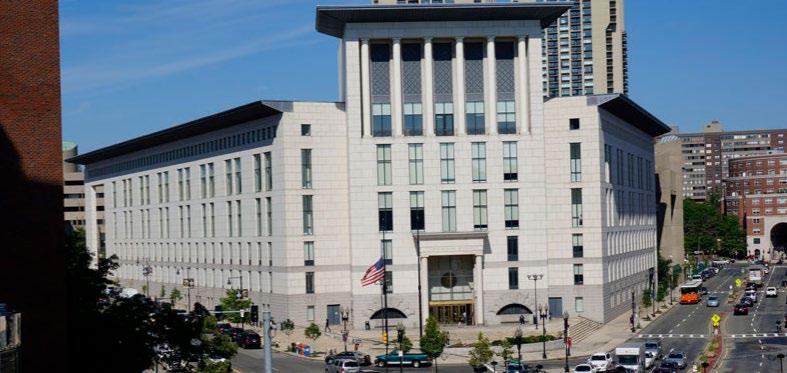
summary process cases and for notifying parties of court events. These updated time limitations are good news for property owners, as they may help further reduce the duration of eviction cases as they move more expediently through the court system.
Specifically, once a summary process case is filed, the court clerk’s office will schedule first-tier events, when necessary, between 30 and 60 days after the date of filing. This is a new time-limit requirement, updating court rules from Standing Order 6-20, which designated no time limit for scheduling first-tier court events, except that they would take place “no sooner than” 14 days after filing.
Plaintiffs (landlords) will be notified within seven days after filing regarding the date scheduled for the first-tier event. This court notice will include court location, time and whether the event is in person or virtual. Plaintiffs will then serve notice, via constable or sheriff, to listed defendants (tenants).
IN-PERSON VS VIRTUAL
Another important change in Standing Order 1-23 is an increase in in-person court events. These new (interim) rules require “all first- and second-tier court events in summary process cases” to
JUNE 2023 20 MASSLANDLORDS NEWSLETTER MASSLANDLORDS IS FUNDED PRIMARILY BY MEMBERSHIP DUES. THANK YOU FOR YOUR SUPPORT.
The Edward Brooke courthouse in Boston houses the eastern division of the housing court and the administrative office for the s tate. Public Domain.
proceed in person. Previous rules allowed many first-tier events, such as mediations and evidentiary hearings, to be held virtually.
This increase in in-person events may present an increased burden on some property owners where attorney representation in court is necessary. The time required for an attorney to drive and walk to a court in person, as opposed to attending virtually, is substantially increased, and may further drive up legal fees.
It also reduces the territory in which an attorney can operate. Some attorneys may operate in some housing court divisions across the state, but not in others. In the case of virtual events, attorneys could attend court events in divisions that they do not operate in in person.
OTHER NOTABLE RULES CHANGES
Other notable updates in Standing Order 1-23 include:
• a resumption of site inspections and property views, which had been suspended since the pandemic. The rules state that housing specialists will take appropriate health and safety precautions to carry out such inspections and views, including “traveling in pairs when practicable.” Standing Order 1-23 also enables the Housing Court to coordinate “hybrid” events in which some parties appear virtually while others appear in person. The rules also state that if one party requests a virtual court appearance, that party may not object to other parties appearing in person.
• a continuation of the requirement that an Affidavit of Compliance accompany any summary process filing for nonpayment. The affidavit asks a landlord to state that their
notice to quit also included a form detailing information regarding rental assistance programs, trial court rules, orders and eviction restrictions and other information as required by M.G.L. Chapter 186, Section 31.

• the addition of a time requirement of 10 days after receipt of request for answers to summary process cases; and no more than three business days before the date of the scheduled first-tier court event. ML
Point your camera app here to read more online
JUNE 2023 MASSLANDLORDS NEWSLETTER
Three Years After Covid Shutdowns, Same Problems Still Frustrate the Rental Assistance Application Process
By Eric Weld, MassLandlords, Inc.
While some improvements have been made with the RAFT application process, delays and lack of communication and transparency continue to frustrate applicants.
By some accounts, applying for statefunded rental assistance, like RAFT, may have improved since the early days of the pandemic. RAFT (Rental Assistance for Families in Transition) is the state’s main funding program for people whose finances and abilities to pay housing expenses were detrimentally affected by illness and pandemic-related business shutdowns. Though the program is funded and overseen by the Department of Housing and Community Development (DHCD), applications are taken in and administered by several regional agencies across the state.
While RAFT may be somewhat better organized now, problems with the application process persist, for sure, as MassLandlords members attest below.
It’s also difficult to determine if issues around language barriers, nonresponse and scores of applications mysteriously “timing out” have been corrected because DHCD doesn’t publicly disclose statistics such as the number of applications it receives, accepts and rejects.
Through 2020 and 2021, tens of thousands of applications were mysteriously “timed out” with no explanation. A
MassLandlords lawsuit against DHCD, seeking information that might inform why so many applicants were rejected and timed out, is still active, though snagged in court. DHCD reports the distribution of more than $300 million in assistance to renters on a running dashboard on the mass.gov website. But without disclosure of key statistics, like applications accepted and rejected, we have no way of knowing if thousands continue to be timed out and unfunded.
We will continue pursuing our DHCD lawsuit to discover more information that can shed light on why applications are timed out without explanation, and
what exactly happened that resulted in many individuals and families losing their homes because they couldn’t procure rental assistance.
PANDEMIC RENTAL ASSISTANCE
RAFT is a long-running program, in existence since 2005. RAFT benefits increased during the pandemic from $4,000 annually to up to $10,000. Recipients may use these benefits to pay rent or other housing-related expenses. (The grant amount decreased briefly, to $7,000 per 12-month period, but has since gone back up to $10,000, where it remains.)
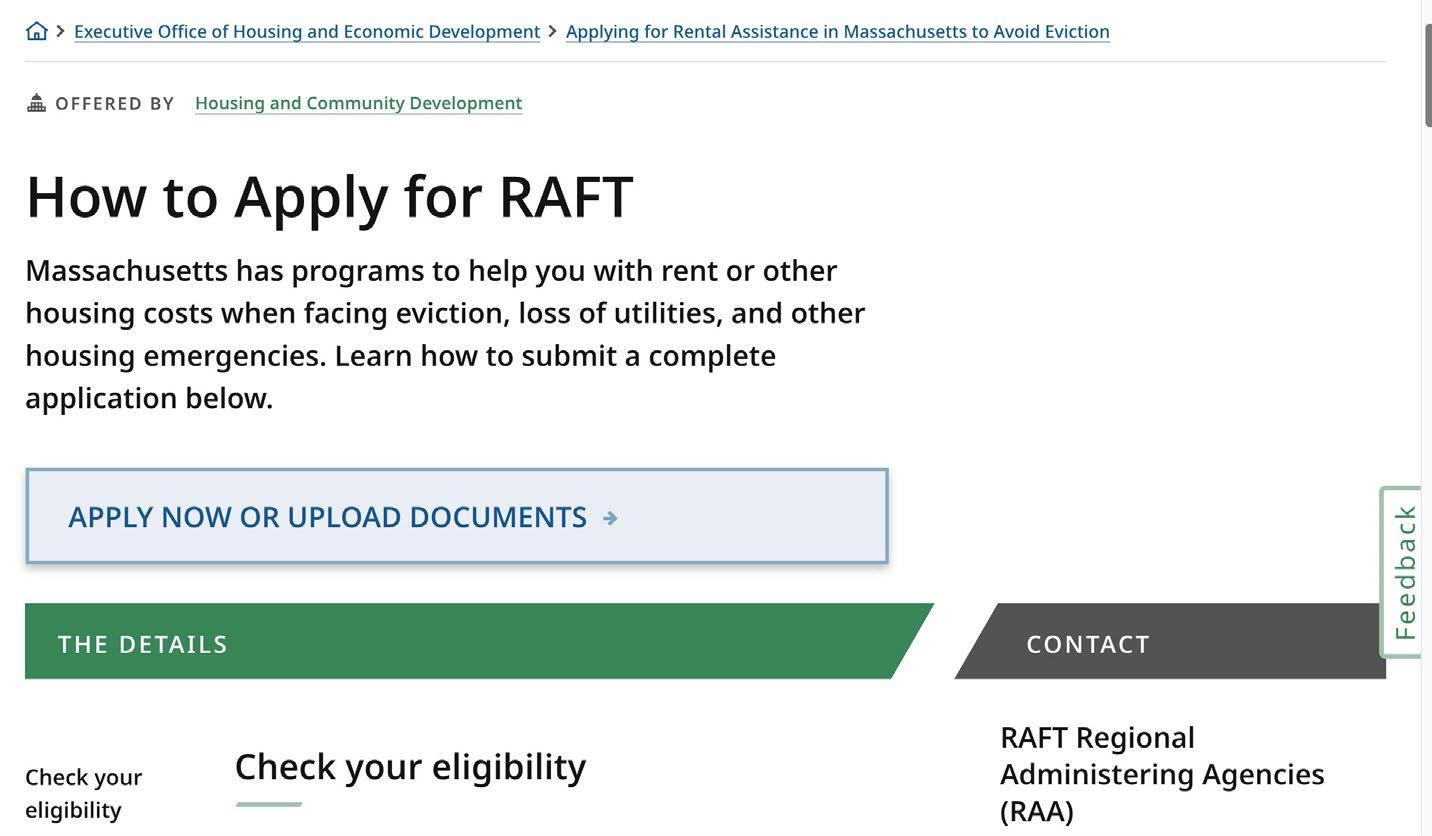
JUNE 2023 22 MASSLANDLORDS NEWSLETTER MASSLANDLORDS IS FUNDED PRIMARILY BY MEMBERSHIP DUES. THANK YOU
YOUR
FOR
SUPPORT.
An introductory screen at mass.gov makes applying for rental assistance look easy. MassLandlords members who have recently applied on behalf of tenants know better. Image: cc by-sa mass.gov.
Other ad hoc rental assistance programs created during the pandemic and partly funded with federal grants included ERAP (Emergency Rental Assistance Program) and ERMA (Emergency Rental and Mortgage Assistance). The ERAP program provided up to 18 months of rental and housing assistance with no dollar limit, as well as funding to help pay utilities. Both of these temporary programs ended, ERMA in 2021 and ERAP in 2022.
RAFT APPLICATION PORTAL
Some might say that RAFT had nowhere to go but up following a rocky year and a half when Covid-19 pandemic setbacks upended people’s finances and housing, and seemed to overwhelm the funding assistance program.
And, at least in some cases, some old wrinkles in the system may have been smoothed.
DHCD has attempted to streamline its operations by introducing a central portal through which applications are submitted. From there, applications are assigned to Regional Administering Agencies (RAAs) for processing. One big improvement in the application process is the addition of a “save and resume” feature on the application website that allows people to begin an application, save it and return to complete it later, rather than having to start all over again if the process gets interrupted.










MIXED EXPERIENCES, MOSTLY NEGATIVE

MassLandlords members who have recently applied for rental assistance on tenants’ behalf report a mixed bag of experiences, though leaning negative. For some, it’s an exercise in patience, frustration and perseverance.

“All in all, the new system is much better than the old,” admits Michael
Bensche, a landlord in Longmeadow. Bensche cites similar frustrations with the system as other landlord applicants. “But then, recently, I had one that was only about two weeks from application to bank deposit, showing that the new system has potential.”
“My experience applying for rental assistance with the new system has not been good,” notes Roger Williams of Springfield, who most recently applied for RAFT on March 29, 2023, on behalf of a tenant. “I have applied for rental assistance before, several times with the old system. I applied four times with the new system for the same tenant. The first three times were not successful due to the tenant not doing what they were supposed to do. My latest application is ‘under review’ and has passed the 21-day application period. Hopefully, I will get paid this time.”
23 JUNE 2023 MASSLANDLORDS NEWSLETTER
MASSLANDLORDS IS FUNDED PRIMARILY BY MEMBERSHIP DUES. THANK YOU FOR YOUR SUPPORT.
CALL TODAY FOR YOUR FREE CONSULTATION WITH CAMBRIDGE SAGE: CAMBRIDGE SAGE #1 Landlord-specialist Realtor in Cambridge, Somerville and surrounding towns FREE property upgrade consults FREE rental pricing recommendations FREE vendor recommendations for handymen, cleaners, snow removal and more No commitments or contracts for rentals Deep expertise in multi-family sales, purchases and rentals in Cambridge, Somerville and Medford FREE property valuations FREE leasing services - only tenants pay broker fee FREE lease renewal services for existing clients OVER 100 ALL 5-STAR GOOGLE REVIEWS SAGE@CAMBRIDGESAGE.COM 617-833-7457
NOT WORKING TOGETHER
The problem that Williams specifies is a common complaint. Landlords can initiate applications and submit documents from their end, but the entire process relies on cooperation and participation from tenants as well. When tenants fail to submit their information as part of the application process on time, the process snags.
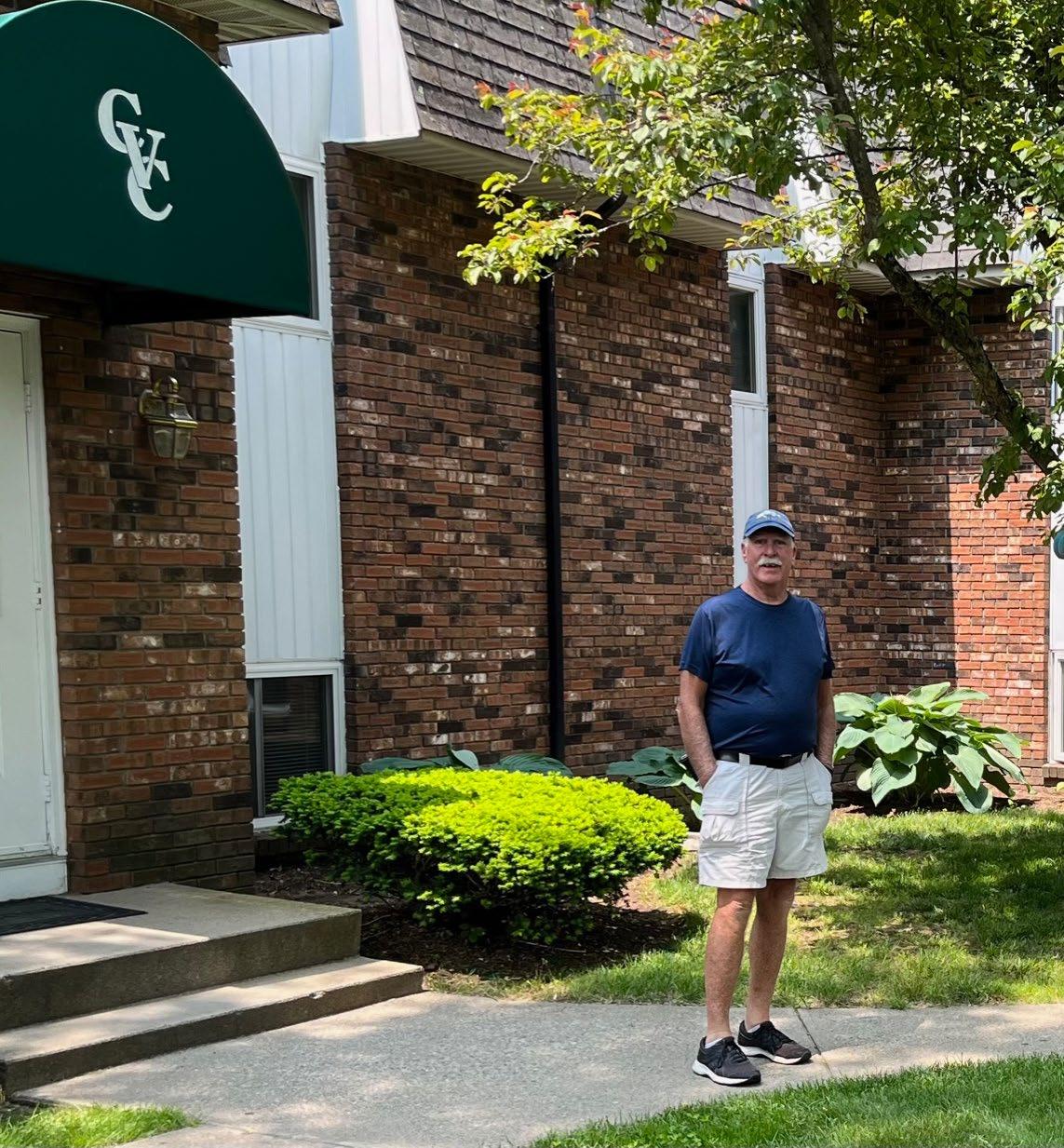
“My biggest criticism is that the landlord is not notified if the tenant does not give requested information,” says Williams. “We don’t find out until it is too late and the application is closed. Then a new application has to be started. If we were notified that the tenant did not give the requested information, we could talk to the tenant about supplying the information.”
Another member with properties in Worcester and Framingham, who asked that his name not be used, notes similar frustrations. “I have some recent experience with RAFT, via RCAP and CMHA in Worcester,” he describes. “It has been pretty negative, some due to my lack of knowledge of these programs, but some due to how poorly designed they are.”
The member cites the lack of information flow and communication among the biggest frustrations. “There is no visibility into the process,” he says, as applicants await responses from RAAs for six to eight weeks from initial submission. “No one who answers the phone or when I visited in person was able to tell me when the application would get processed. When the money arrives, if it arrives, the tenant is likely even more behind
and you have to do the whole application dance again.”
RENT FALLING FURTHER BEHIND
That is one of the main problems with the current structure of RAFT, says Jo Landers, who rents properties in Holyoke.
“One big problem is that there’s a complete disincentive for tenants to pay rent while their application is pending,” she says. “And the applications are taking so long that by the time they get back to us, the arrears are building even more.”
And, as the Worcester landlord points out, in cases in which available RAFT funds won’t cover the entire cost of arrears due, RAFT asks tenants to sign an agreement stating that they will be responsible for the leftover money owed to landlords that is not covered by the RAFT grant. But there appears to be no repercussions for tenants who refuse or neglect to sign such agreements. In many cases, landlords have no recourse but to absorb that cost or move toward eviction.
DHCD CORRESPONDENCE TO ALL APPLICANTS?
Landers has applied for RAFT multiple times in recent years, sometimes several times for the same tenant. She echoes similar problems with the process as other landlords. She has also had applications rejected or timed out because her tenant didn’t submit requested information. Sometimes it’s a technical issue on the tenant’s part, she says. Other times the tenant claims not to have received the request from the RAA.
If DHCD only installed a mechanism in which landlords are copied on correspondence with their tenants, or in which all communications pertaining to one funding application went to all parties on the application, who knows how many thousands more applications might remain viable, she notes.
Bensche agrees. “They give each party a separate application number,” he says. “Why they want to have different app numbers for the tenant and landlords is beyond me. I have been asked to upload documents to case numbers I have never seen.”
JUNE 2023 24 MASSLANDLORDS NEWSLETTER
IS
MASSLANDLORDS
FUNDED PRIMARILY BY MEMBERSHIP DUES. THANK YOU FOR YOUR SUPPORT.
MassLandlords member Michael Bensche, pictured in front of his rental building in Longmeadow, has had some recent success with RAFT, but also describes some frustrations with the application process. Image: cc by-sa Michael Bensche.
WISH LIST OF REMEDIES
Landers and other members have seen the RAFT application process work on occasion. But it’s the general inefficiency and inconsistencies that they complain about. Too many times they’re asked to submit documents that they’ve already submitted, sometimes for a third time. And when an application times out because a tenant has lapsed in submitting requested information, landlords have to begin the application process all over again, resubmitting the same information, wastefully repeating the process, again two or three times in some cases.
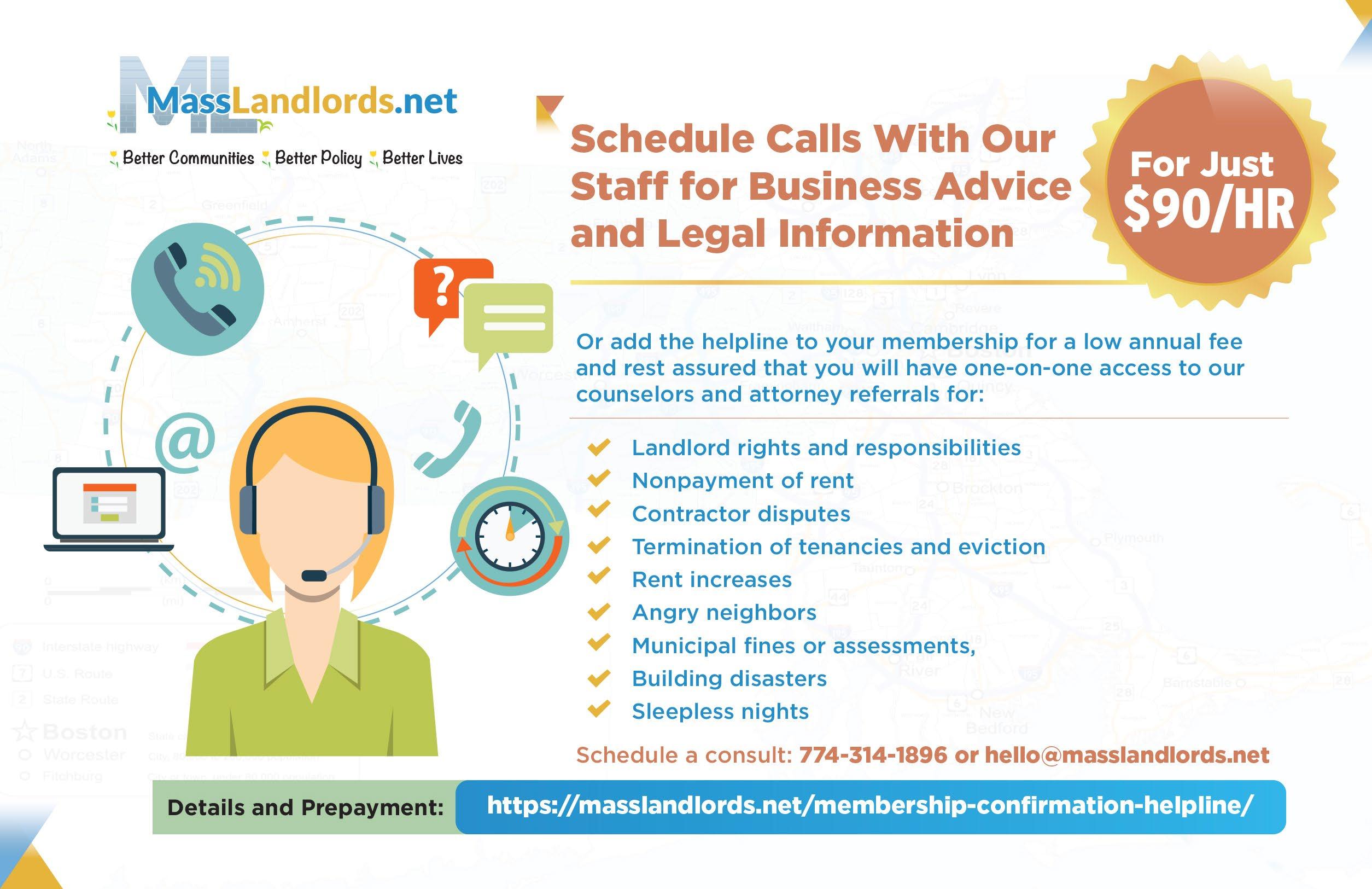
“Deal with whatever is causing these horrendous delays, number one,” says Landers. That likely means more money from the state to shore up extra personnel, she acknowledges. “And do something about this issue of disincentivizing tenants from paying rent or partial rent while applications are pending.”
Further down the wish list, she would request some way to report problems or give feedback to DHCD. (The application
website does list phone numbers and chats available with Mass 211, a statewide nonprofit resource that provides information and assistance for a menu of health and human services programs, including housing and rental assistance.)
SOME ADVICE FOR RAFT APPLICANTS
Given the possible delays and uncertainties with rental assistance, and considering the expiration (for now) of Chapter 257 of the Acts of 2020, which disallowed evictions while applications for rental assistance were pending, Landers suggests moving ahead with evictions simultaneously with RAFT applications, at least for undesired tenants.
“Assume that your application is going to take three months,” she says, and that rent arrears are going to continue building while you await word from RAFT. Also assume that you may have to resubmit documents more than once.
And don’t assume that a RAFT grant is going to cover the amount of rent owed.
DEALING WITH AN UNFAIR TIME-OUT
One strategy that has succeeded at least once in reversing a time-out is the public records request: Ask the RAA to see your timed out application and all communications from them to you and your renter. Consult with an attorney first, but the request would be filed jointly by you and your renter so that there could be no objection raised with regard to renter confidentiality.
A public records request puts an RAA in the uncomfortable position of choosing whether they are an agent of the state or not. If they are an agent of the state, then they are a record holder. They must comply with public records law and lay bare the full paper trail of their shortcomings. Typically, for instance, they will be unable to produce any document showing they tried to contact you or the renter for missing information.
25 MASSLANDLORDS IS FUNDED PRIMARILY BY MEMBERSHIP DUES. THANK YOU FOR YOUR SUPPORT.
Alternatively, if the RAA claims that it is not an agent of the state, then they must be engaged in the business of rental assistance. In this case you as landlord and renter both could make a complaint for triple damages plus attorney’s fees under General Law Chapter 93A. Nonprofits are not exempt from 93A. Timing-out an eligible application with inadequate follow-up is manifestly unfair. This is an untested legal theory, but it has not yet needed to be tried.
We have suggested this course of action several times and to the best of our knowledge, each RAA has made no claims in response either way. Instead, each RAA has chosen the third path: they reversed the time-out and paid the requested rental assistance.
APPLYING FOR RAFT CONCLUSION
It’s likely that DHCD and RAAs were overwhelmed with applications early in the Covid-19 pandemic, and some inefficiencies could be understood within that context. But now, more than three years since the pandemic disrupted so many people’s finances and housing, it’s hard to accept that many of the same issues remain with the application process.

Worse are the results of those delays and inefficiencies. People are forced to move out of their homes because they don’t receive the funding they need – in many cases with no explanation.
We would prefer that DHCD cooperate in providing the public information we seek to determine RAFT outcomes and help renters get the assistance they need.

Were DHCD more transparent and held accountable for statistical information, it would likely assist in analyzing and remedying shortcomings in the system. Without that cooperation, our alternative is to continue litigation to force the release of such data, at unnecessary public expense. ML

JUNE 2023 26 MASSLANDLORDS NEWSLETTER MASSLANDLORDS IS FUNDED PRIMARILY
YOU
YOUR SUPPORT.
BY MEMBERSHIP DUES. THANK
FOR
your camera app here to read more online YOUR ENVIROMENTAL
AND
FORDSHOMETOWN.COM
Point
PEST
LAWN PROFESSIONALS

REGIONAL
MassLandlords Upcoming events
See details under each region
2023 JUNE
2023 JULY
REGIONAL JUNE 2023 28 MASSLANDLORDS IS FUNDED PRIMARILY BY MEMBERSHIP DUES. THANK YOU FOR YOUR SUPPORT. J ULY 2022
SUNDAY MONDAY TUESDAY WEDNESDAY THURSDAY FRIDAY SATURDAY 1 2 3 4 5 6 7 8 9 10 SWLCA 120K in Free Heat Pumps NWCLA 6:00pm-8:00pm 12:00pm - 12:30pm 7:00pm-9:00pm 11 12 13 14 15 16 17 18 19 20 21 22 23 24 Security Deposits 12:00pm - 1:00pm 25 26 27 28 29 30 Civil Process 5:00pm - 6:40pm SUNDAY MONDAY TUESDAY WEDNESDAY THURSDAY FRIDAY SATURDAY 1 Virtual Meeting 5:00pm - 6:40pm 2 3 4 5 6 7 8 9 10 11 12 13 14 15 Virtual Meeting 12:00pm - 1:00pm 16 17 18 19 20 21 22 23 24 25 26 27 28 29 Proposed bylaws change 12:00pm - 1:00pm 30 31
Virtual Meeting: Success Story: 120K in Free Heat Pumps to replace Electric Baseboards
landlord. Uli manages six up-and-down duplexes in Pittsfield that used to be electric resistance heat, and now operate with mini-splits.
Members register for no charge in just a few clicks!
“No Sales Pitch” Guarantee
Questions may be asked over microphone after using the “raise hand” feature of zoom. Questions may also be entered via the Zoom text chat box.
Virtual Meeting Details
(hosted by Zoom)
We will share our video, audio, and computer screen and slides.
This presentation will focus on a landlord success story in Pittsfield, where electric resistance heat cost up to $600 per month last winter. We will learn:
• Heat pumps offer heating and air conditioning for less than the operating cost of electric resistance.

• The capital cost to install heat pumps can be very low or zero thanks to incredible Mass Save and other rebates.
• Community action councils and others can help you cut the red tape to access these benefits now.
• How to train tenants on cleaning and correct usage.
This presentation is part of educational outreach made possible by the ener-Gsave program at the Harold Grinspoon Charitable Foundation.
Attendees will leave feeling empowered to get rid of all their electric resistance heat.
MassLandlords offers attendees of directly managed events a “No Sales Pitch” guarantee. If a guest speaker offers services, their presentation will not discuss pricing, promotions, or reasons why you should hire them. We do not permit speakers to pay for or sponsor events. Guest speakers are chosen for their expertise and willingness to present helpful educational content. Your purchase of an event ticket sustains our nonprofit model.
WEDNESDAY, JUNE 7TH
VIRTUAL MEETING AGENDA
12:00 pm Presentation
12:30 pm Virtual Meeting ends
By member survey, the business update has been reimagined as a set of convenient videos viewable anytime online.
Participation is Easy
We have two formats of online events:
• Virtual meetings include optional audience participation via video, phone, and screenshare and, unless stated otherwise, are not recorded.
• Webinars have limited participation options (typed questions only) and, unless stated otherwise, are recorded. Our virtual registration desk is open for all events one hour starting 30 minutes prior to the event start time. Call 774-314-1896 or email hello@masslandlords.net for live, real-time help signing in and using your technology.
If joining a virtual meeting, please use the zoom “test audio” feature. You will be allowed to talk to others if your microphone is good and there is no background noise. We reserve the right to mute anyone for any reason. Attendees without a microphone or who don’t want to be heard can type questions.
• Optional: You can share your video with everyone, talk to everyone, and type chat with everyone. Video sharing is not required. Talking is not required.
Password will be emailed and viewable online
Topic: Heat Pumps Virtual Meeting June 7, 2023
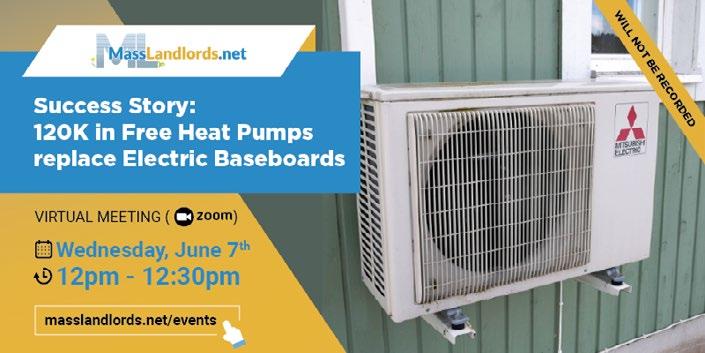
Time: Jun 7, 2023 12:00 PM Eastern Time (US and Canada)
Join Zoom Meeting https://us02web. zoom.us/j/81803082107
Meeting ID: 818 0308 2107 Passcode: Will be emailed and viewable online
Dial by your location
+1 305 224 1968 US
+1 309 205 3325 US
+1 312 626 6799 US (Chicago)
+1 646 876 9923 US (New York)
+1 646 931 3860 US
+1 301 715 8592 US (Washington DC)
+1 253 215 8782 US (Tacoma)
+1 346 248 7799 US (Houston)
+1 360 209 5623 US
+1 386 347 5053 US
+1 408 638 0968 US (San Jose)
+1 507 473 4847 US
+1 564 217 2000 US
+1 669 444 9171 US
+1 669 900 6833 US (San Jose)
+1 689 278 1000 US
+1 719 359 4580 US
+1 253 205 0468 US
Meeting ID: 818 0308 2107 Passcode: Will be emailed and viewable online
Find your local number: https://us02web. zoom.us/u/kbjGMPDZau
PRICING
Open to the public. Membership is not required!
• Public: $10
This presentation will be given by Uli Nagel, Project Director for ener-G-save/ Cooler Communities, Harold Grinspoon Charitable Foundation, and small
ACCESSIBILITY
Automatic closed captions may be activated at any time. Simply turn on this setting from inside the Zoom app.
• Members: No charge. Registration is required.
Public Registrants: Please note that by registering for this event you will
REGIONAL 29 JUNE 2023 MASSLANDLORDS IS FUNDED PRIMARILY BY MEMBERSHIP DUES. THANK YOU FOR YOUR SUPPORT. STATEWIDE
Mitsubishi is a popular choice for air source heat pumps in the U.S., but many brands now offer cold-rated models. Image: CC-BY-SA-4 by Santeri Viinamäki
WED 06/07
be automatically added to our mailing list. You can always unsubscribe from our mailing list, by clicking on unsubscribe link at the bottom of any email you may receive.
Registration in advance is required. This event will not be recorded. Slides and handouts if any will be uploaded to heat pumps to replace electric baseboard
Members register for no charge in just a few clicks!
This event is operated by MassLandlords, Inc. staff.
This Virtual Meeting counts for continuing education credit for Certified Massachusetts Landlord Level Three. Beep in Leave feedback/beep out Want to speak at a MassLandlords meeting? Submit a speaker request.
This is part of the Virtual rental real estate networking and training series.
Add our entire event calendar to yours:
Google: add our entire event calendar to Google calendar.
iPhone & iPad: add our entire event calendar to iCal.
Outlook: add our entire event calendar to Outlook.
Add just this event to your calendar: Google: add just this event to Google calendar.
STATEWIDE Virtual Meeting: Security Deposits, Last Month’s Rent and Move-in Monies
• First month’s rent
• Last month’s rent
• Security deposit
• Locks
Security deposits are one of the primary liabilities for Massachusetts landlords. If you make a paperwork mistake, you might owe your renter three times the amount of the deposit plus attorney’s fees! But we’ll show you how to protect your property with a deposit, and how to protect your business with bulletproof compliance.
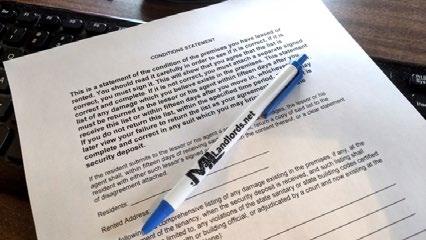
We will compare and contrast security deposits with last month’s rent. Can you charge a pet deposit?
Application fee? Amenity fee? Attend and ask why not.
Attendees will leave knowing what Massachusetts law requires when taking move-in monies and how to operate with peace of mind.
and residential real estate closings. Attorney Greenman has a well-respected reputation for aggressively advocating for her clients’ goals and ensuring beneficial outcomes at a reasonable cost. She was among the first attorneys to take legal action in response to the unfunded eviction moratorium and has been working as co-counsel on a pro bono basis with the recent Boston Eviction Moratorium.
“Attorney Greenman is such a great source of common sense and specialized wisdom!” -David
Purchase your ticket in just a few clicks!
“No Sales Pitch” Guarantee
MassLandlords offers attendees of directly managed events a “No Sales Pitch” guarantee. If a guest speaker offers services, their presentation will not discuss pricing, promotions, or reasons why you should hire them. We do not permit speakers to pay for or sponsor events. Guest speakers are chosen for their expertise and willingness to present helpful educational content. Your purchase of an event ticket sustains our nonprofit model.
FRIDAY, JUNE 23RD
WEBINAR AGENDA
• 12:00 pm Presentation
• 1:00 pm Webinar ends
By member survey, the business update has been reimagined as a set of convenient videos viewable anytime online.
Participation is Easy
We have two formats of online events:
You’ll be ready to take a fully compliant security deposit after this training
This presentation will teach how to take move-in monies as a landlord in Massachusetts. We will discuss the four allowable charges:
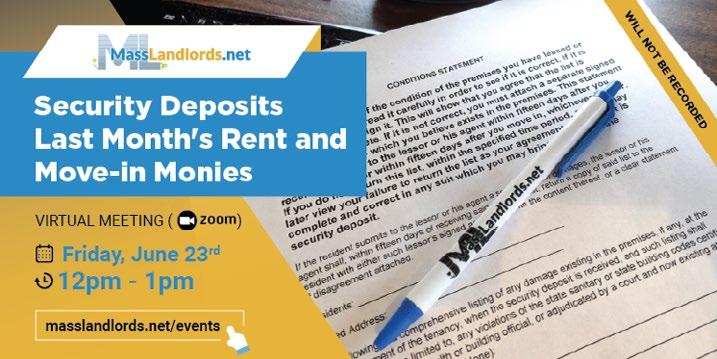
Part of this presentation will be given by Attorney Jordana Roubicek Greenman, a real estate lawyer, recipient of the Super Lawyers Rising Star award 2012-2020, and one of Boston Magazine’s Top Lawyers of 2022. Attorney Greenman has a solo practice with a main office in Watertown and additional office in Downtown Boston. Her practice consists of a broad range of real estate-related legal matters, including commercial and residential landlord/tenant disputes, condominium association representation, general real estate litigation and commercial

• Virtual meetings include optional audience participation via video, phone, and screenshare and, unless stated otherwise, are not recorded.
• Webinars have limited participation options (typed questions only) and, unless stated otherwise, are recorded. Our virtual registration desk is open for all events one hour starting 30 minutes prior to the event start time. Call 774-314-1896 or email hello@masslandlords.net for live, real-time help signing in and using your technology.
If joining a virtual meeting, please use the zoom “test audio” feature. You will be allowed to talk to others if your microphone is good and there is
REGIONAL JUNE 2023 30 MASSLANDLORDS IS FUNDED PRIMARILY BY MEMBERSHIP DUES. THANK YOU FOR YOUR SUPPORT.
Attorney Jordana Greenman
FRI 06/23
no background noise. We reserve the right to mute anyone for any reason. Attendees without a microphone or who don’t want to be heard can type questions.
ACCESSIBILITY

Automatic closed captions may be activated at any time. Simply turn on this setting from inside the Zoom app. Questions may be asked over microphone after using the “raise hand” feature of zoom. Questions may also be entered via the Zoom text chat box.
Webinar Details (hosted by Zoom)

We will share our video, audio, and computer screen and slides.
• Optional: You can share your video with everyone, talk to everyone, and type chat with everyone. Video sharing is not required. Talking is not required. Password will be emailed and viewable online.
When: Jun 23, 2023 12:00 PM Eastern Time (US and Canada)
Topic: Security Deposits

Webinar 2023 June 23
Please click the link below to join the webinar: https://us02web.zoom. us/j/84189118087
Passcode: Will be emailed and viewable online
Or Telephone: Dial(for higher quality, dial a number based on your current location):
our mailing list, by clicking on unsubscribe link at the bottom of any email you may receive.
Registration in advance is required. This event will be recorded. The recording will be uploaded to Security Deposits .
Purchase your ticket in just a few clicks!
This event is operated by MassLandlords, Inc. staff.




Webinar ID: 841 8911 8087 Passcode: Will be emailed and viewable online International numbers available: https:// us02web.zoom.us/u/kcsRkLq1Gn
PRICING
Open to the public. Membership is not required!
• Public: $12
• Members: $4
Public Registrants: Please note that by registering for this event you will be automatically added to our mailing list. You can always unsubscribe from
This Webinar counts for continuing education credit for Certified Massachusetts Landlord Level Three. Beep in Leave feedback/beep out Want to speak at a MassLandlords meeting? Submit a speaker request. This is part of the Virtual rental real estate networking and training series. Add our entire event calendar to yours: Google: add our entire event calendar to Google calendar.

iPhone & iPad: add our entire event calendar to iCal.
Outlook: add our entire event calendar to Outlook.
Add just this event to your calendar: Google: add just this event to Google calendar.
REGIONAL 31 JUNE 2023 MASSLANDLORDS IS FUNDED PRIMARILY BY
MEMBERSHIP DUES. THANK YOU FOR YOUR SUPPORT.
+1 646 931 3860 US +1 301 715 8592 US (Washington DC) +1 305 224 1968 US +1 309 205 3325 US +1 312 626 6799 US (Chicago) +1 646 876 9923 US (New York) +1 408 638 0968 US (San Jose) +1 507 473 4847 US +1 564 217 2000 US +1 669 444 9171 US +1 669 900 6833 US (San Jose) +1 689 278 1000 US +1 719 359 4580 US +1 253 205 0468 US +1 253 215 8782 US (Tacoma) +1 346 248 7799 US (Houston) +1 360 209 5623 US +1 386 347 5053 US
PROPERTY MANAGEMENT We specialize in the ongoing management and maintenance of single family multi-family commercial rental properties and vacant properties (413) 377-5335 Information witmanproperties com
Northern Worcester County Landlord Association Fitchburg Dinner Meeting: Nonpayment & Attorney Burrell
o Networking draws from 25 towns including Fitchburg, Gardner, Leominster, Athol, Holden, Ayer, Orange, Ashburnham, Spencer, Ashby, Lunenburg, Townsend, Westminster, Princeton, Sterling, Lancaster, Shirley, Groton, Pepperell, Winchedon, Templeton, and Hubbardston.

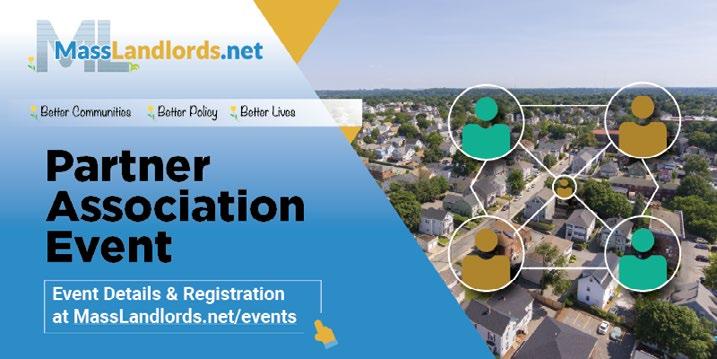
LOCATION
British American Club
1 Simonds Road Fitchburg, MA 01420
FOOD
• Dinner will be provided.
PRICING
Join us for our monthly meeting, this month we will hear from sponsor Attorney Mark Burrell, and explain what you need to know about 30-day non-payment regulations.
Mark Burrell is a seasoned Landlord/ Tenant attorney and has the unique perspective to look at your situation from the eyes of the defendant’s attorney. In addition to knowing the ins and outs of what to look for in possible glitches to your legal process and documents that may trip us up as landlords; Attorney Burrell is a great storyteller and we are sure you will be entertained at this event. Meetings are open to the public! Zoom tickets are $10. Zoom meeting information will be provided the day of the event. First-time in-person visitors can attend for $20 per person to “check us out,” with dinner included. If they decide to join, the $20 will be applied to an NWCLA membership, or sponsorship of choice, that night. Become a member and the annual dues pay for all 10 meetings a year!
Public attendees can purchase your ticket in just a few clicks!
THURSDAY, JUNE 8TH
NWCLA DINNER MEETING AGENDA Visit nwcla.com for any last-minute updates or changes.
• 7:00pm Dinner, Networking & Presentations
Open to the public. Membership is not required!
• Public and non-NWCLA members In Person: $20
• Public and non-NWCLA members Zoom: $10
• NWCLA members only In Person: No charge. This event will not be recorded. Slides and handouts if any will be uploaded to https://www.nwcla.com/ members/meeting-recordings/. This event will be recorded and accessible for active NWCLA members only. Please note if you are not an active NWCLA but do purchase a ticket you will not be able to access the recording
Public attendees can purchase your ticket in just a few clicks! This event is operated by volunteers at a partner association.
METROWEST
SOUTHERN WORCESTER COUNTY
Southern Worcester County Landlord Association
Southbridge Dinner Meeting : Members and Advertisers Appreciation Cookout
No speakers, no agenda, just a good, social cookout in the parking lot. Hotdogs, hamburgers, softdrinks, and snacks will be provided.
We have a limited number of chairs available – so you might want to bring a folding chair of you own.
In the event of inclement weather we’ll meet inside and dine on takeout. This is a first-time event for us. The Board decided that since June is the last meeting of the season and New England summer is about to arrive, it might be enjoyable just to meet informally with our valued advertisers for relaxed conversation and friendship. If this format for June meets with favorable results, we might do the same next year. Please let us know.
MONDAY, JUNE 5TH
SWCLA DINNER MEETING AGENDA
• 6:00pm Event Start
LOCATION
Southbridge Community Center (aka Casaubon Senior Center) 153 Chestnut St. Southbridge, MA 01550
PRICING
Open to SWCLA Members only. Pay annual SWCLA dues then free.
• SWCLA members only: No charge.
• General public, in person meeting is free the first time, then pay $50/yr for membership.
This event will not be recorded. Slides and handouts if any will be uploaded to SWCLA.
This event is operated by volunteers at a partner association.
REGIONAL JUNE 2023 32 MASSLANDLORDS IS FUNDED PRIMARILY BY MEMBERSHIP DUES. THANK YOU FOR YOUR SUPPORT.
NORTHERN WORCESTER COUNTY
THU 06/08 MON 06/05

33 MASSLANDLORDS IS FUNDED PRIMARILY BY MEMBERSHIP DUES. THANK YOU FOR YOUR SUPPORT. STORE WIDE Kitchens, Baths, Floors, Windows, Doors, and a whole lot more at the GUAR ANTEED LOWEST PRICE 20% OFF APRIL 13-15 3 Days Only
MassLandlords Thanks Our Property Rights Supporters
Property Rights Supporters make monthly contributions earmarked for policy advocacy.
OWNERS COOPERATIVE
$100 and Up Arrow Properties, Inc. Allison Gray. Curtis Corliss. Haddad Real Estate. Hilltop Group Holdings. Rich Merlino. Premier Choice Realty. Spring Park Properties. Stony Hill Real Estate Services.
OWNERS CLUB
$50 to $99 Erin Zamarro, Real Estate Broker. Foxworth Properties, LLC. Michael Goodman. Harbor View Realty Trust. Hilltop Realty. Brian Keaney. Mary Norcross. Jim O’Brien. PCPA LLC. Shamrock Management. Slope Properties LLC. Bob Smith. Michael Totman. Union Realty. Urban Lights LLC. Winsser Realty Trust. Witman Properties Inc.
WORKING TOGETHER CLUB
$20.25 to $49 557 Union Avenue Realty Trust. Yan Alperin. Beacon Hill Property Management. Broggi R.E. & Property Mgmt Inc. Linda Caterino. McCharles Craven. CHELSEACORPLLC. Michael Donahue, Bob Finch. Lucille Fink. Dana Fogg. Royce Fuller. GMC Property Management LLC. Haverhill Multi-Family, LLC. Janice E Sawyer Family Trust. JCCarrig Real Property. Karen Jarosiewicz. King Craft Property Mgmt. Matthew Maddaleni. Kristina MiduraRodriguez. Vincent Monaco. Jill Monahan. Darlene Musto. Alex Narinsky. Liz O’Connor. Olson Apartments. Glenn Phillips. Cheryl Popiak. Ted Poppitz. Real Property Management Associates. Chris Rodwill. Alexandra Schoolcraft. South Shore Apartments, Wembley LLC. The Claremont Living LLC. Webber and Grinnell Insurance. Lorenzo Whitter. Lorenzo Whitter.
WORKING TOGETHER CIRCLE
Up to $10 Up to $10. AAMD MGT. AFL Properties. Ascorp Inc. Bernard Welch Realty Inc. Chris Adler. Lori Amara. Rob Barrientos. Ray Boylan. Broggi R.E. & Property Mgmt Inc. CC&L Properties, LLC. Corofin Properties. Demers Enterprises. Liz Dichiara. Dietschler Properties. Eastfield Family Trust. Energywise homes, Inc. Deborah Entwistle. Margaret Forde. Forge Property Management. Erik Govoni. Ross W. Hackerson. Lori Haims. Hancock Holdings LLC. Mike Hempstead. JD Powers Property Management LLC. JMG Realty & Investments. Gayle Joseph. Catherine Jurczyk. Kee 55, Inc. Agency Account C/O Ercolini. Kubera Properties. John Kubilis. Altagracia Lama. Jo Landers. Geri Ledoux. Brandon Lee. MassBay Group. Shane McGlone. Anthony Membrino. Ana Monte. Pavel Novikov. Jordan Nunley. Michael Ozog. Mary Palazzo. PJM Property Management. Alvan Pope. Tara Pottebaum. Property Realty Group LLC. Douglas Quattrochi. Real Property Management Associates. Kathryn Rivet. Lisa Rizza. Cary- Amy Rose. Michael Siciliano. Jonathan Siegel. John Siri. Joann Strub. Summit Rentals LLC. TJB Properties. Tomaltach 0’Seanachain Realty Trust. Topaz Realty Trust. Vadim Tulchinsky. Snaedis Valsdottir. Mark Waitkevich. Stuart Warner. Westmass Apartments LLC. Kim Wu. Alexa Zaccagnino.
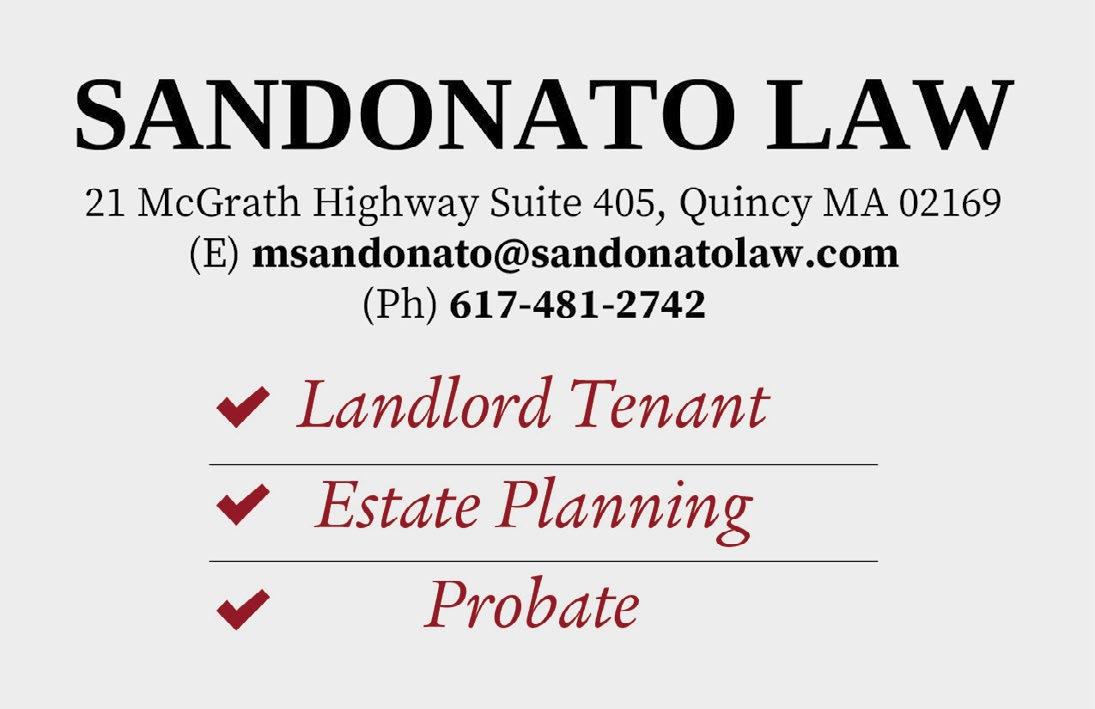
One-time and bespoke donations sincerely appreciated, too numerous to list here.
To join, complete a pink sheet at any MassLandlords event or sign up online at MassLandlords.net/property
REGIONAL JUNE 2023 34 MASSLANDLORDS IS FUNDED PRIMARILY BY MEMBERSHIP DUES. THANK YOU FOR YOUR SUPPORT.
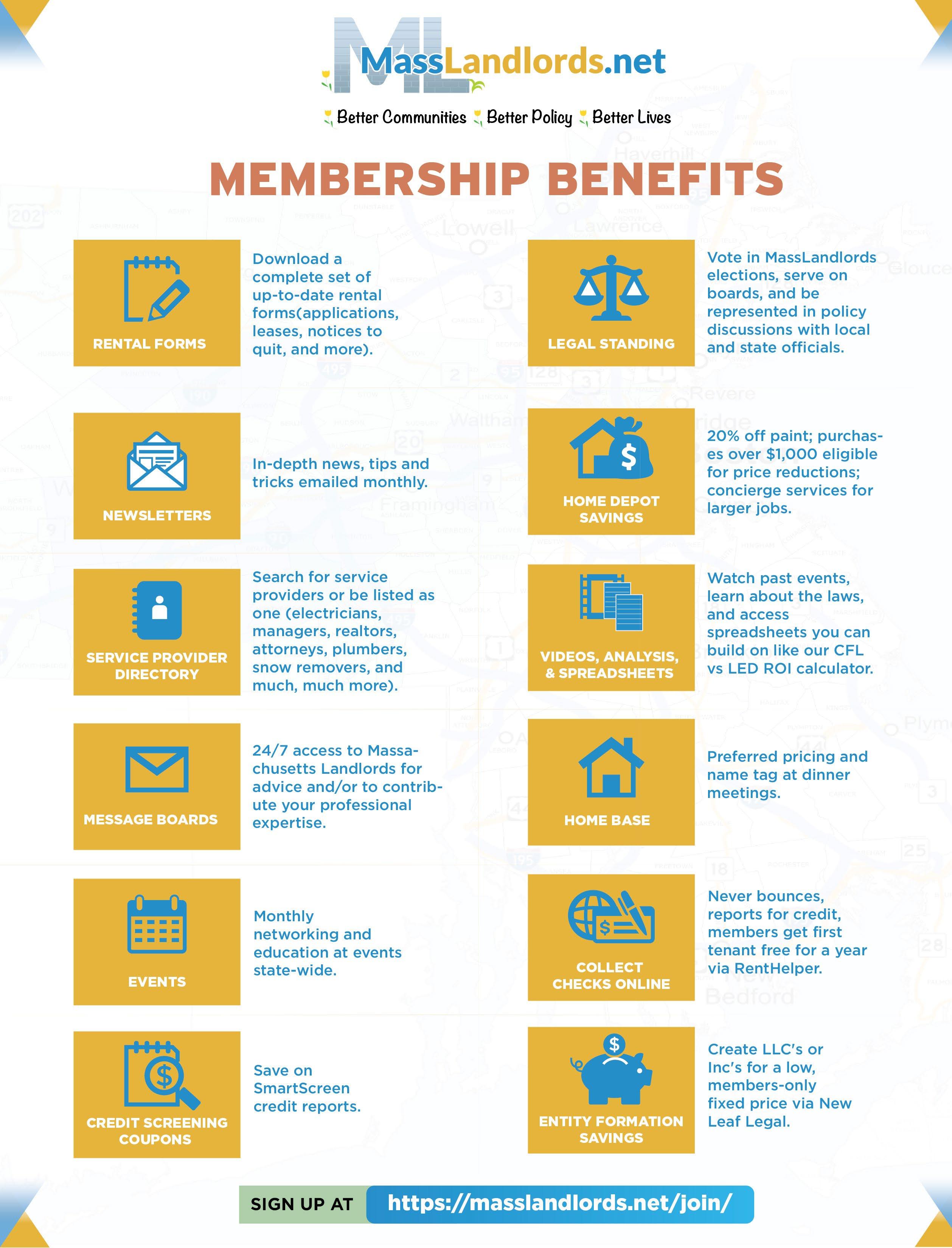
MassLandlords
One Broadway, Floor 14
Cambridge, MA 02142
SUBSCRIBE TODAY

Perfect to share at the office. members can add print delivery for an additional $90 per year. become a member and subscribe online at masslandlords.net/join
Support better housing policy and housing journalism in Massachusetts.
JUNE 2023 36 MASSLANDLORDS NEWSLETTER MASSLANDLORDS IS FUNDED PRIMARILY BY MEMBERSHIP DUES. THANK YOU FOR YOUR SUPPORT.




















 By Kimberly Rau, MassLandlords Inc.
By Kimberly Rau, MassLandlords Inc.




































